#even though its not to the public...they move the world for themselves...
Explore tagged Tumblr posts
Text
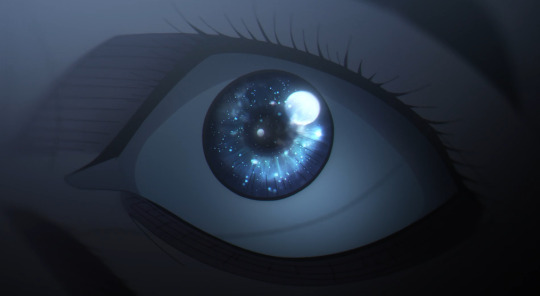

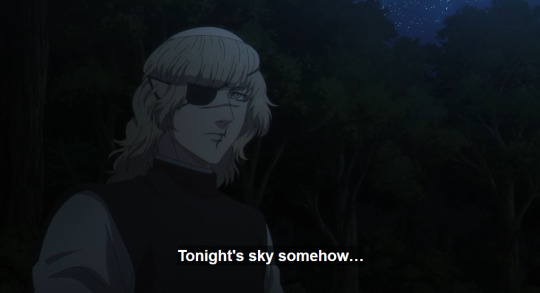
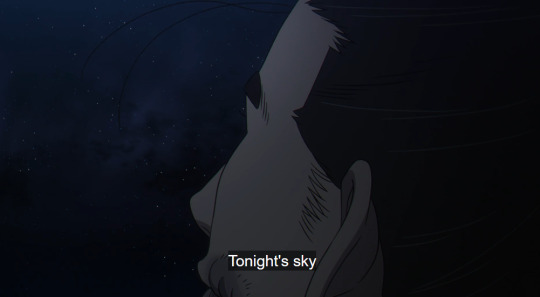
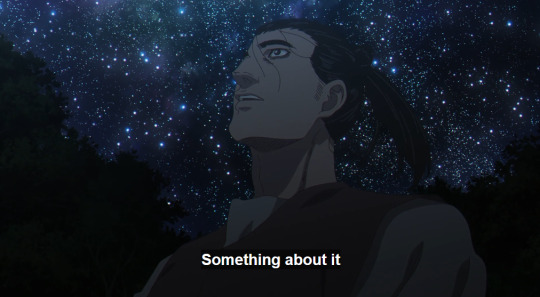


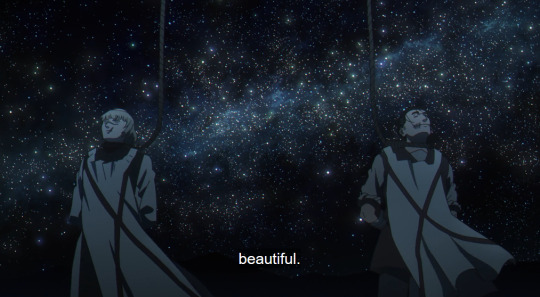
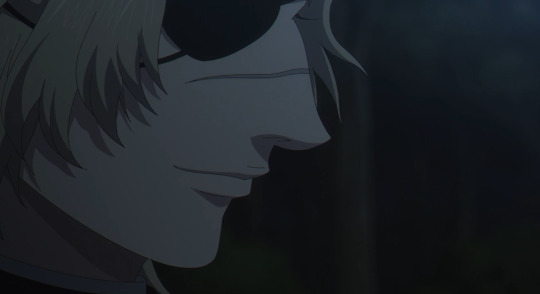
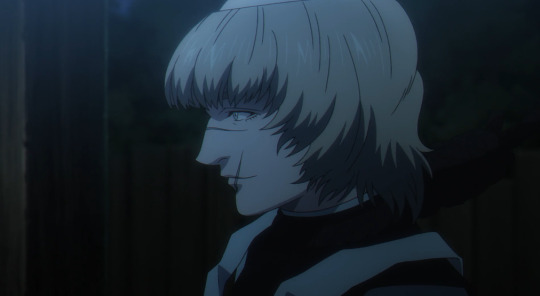
The parallels between episode 6 and 14 kill me BUT Badeni's line at the end of episode 6 punches me in the gut and sends me into orbit.
"There's only one thing to make that 'something' absolute. Move...the world."
AND THEN THEY DO MAKE IT ABSOLUTE!!! THEY MOVE THE WORLD!!! AND NOW OCZY'S FINAL WORDS ARE FILLED WITH CONVICTION AND FULL CONFIDENCE.
No longer "something about the night sky is beautiful". No, he says "tonight's sky is definitely beautiful." and that makes me cry.
#even though its not to the public...they move the world for themselves...#they solidified the theory#it lives in their hearts#i'm going to throw up i HATE THIS STUPID SHOWWWWW#the mirroring of thestart of their journey vs the end oooooohhhh my god..#not just the shot composition but the lines AND THE WAY THEY'VE CHANGED.....GUHOOOOOO#i love my bookends#orb: on the movements of the earth#chi chikyuu no undou ni tsuite#oczy#badeni
163 notes
·
View notes
Text
some facts about robert prevost (leo xiv) that i think are important to know:
while he was born in chicago, he has spent the vast majority of his life outside of america. he went to rome at a young age, then spent most of his priesthood in peru
pope leo xiii was well known for his interest in social justice -- the fact that prevost chose this name may show that he also nurses an interest
he was one of pope francis' closest advisors
he's described as being balanced in terms of his outlook, but has progressive views on some specific issues, including migrants and poverty
he is relatively young -- we will probably have pope leo xiv for a long time
quote from CBS article: "While Prevost is seen overall as a centrist, on some key social issues he's viewed as progressive. He has long embraced marginalized groups, a lot like Francis, who championed migrants and the poor."
another quote: "Cardinal George of Chicago, of happy memory, was one of my great mentors, and he said: 'Look, until America goes into political decline, there won't be an American pope.' And his point was, if America is kind of running the world politically, culturally, economically, they don't want America running the world religiously. So, I think there's some truth to that, that we're such a superpower and so dominant, they don't wanna give us, also, control over the church." -Robert Barron, bishop of a diocese in Minnesota
so while it does leave a bad taste in the mouth to have an american pope at this time, he is definitely not the kind of pope trump will like, nor will the conservative base. while he probably won't catapult the church into a lot of uncharted territory, he does look as if he will at the very least continue and support the work francis laid the groundwork for
additional information:
apparently he is involved in sexual assault coverups -- not fantastic, but to be honest the entire catholic church is so incredibly guilty of this it's not surprising
robert prevost has tweeted five times since joining twitter. one of those tweets was telling jd vance he does not understand love
updating information: "He didn't cover up those cases though. It seems like he opened the investigation in the case of the two women who were abused and encouraged them to go to the police, and then the investigation was closed by someone higher up than him afterwards. With the priest who abused kids, yes he let the abuser live at the priory—under supervision, which given that abusers have to live SOMEWHERE I'm glad that it was somewhere he was being observed. (In any case when the USCCB revised the rules two years later to be stricter, the abuser was moved somewhere else; Prevost was just following regulations as they existed at the time.) As for the accusations Sodalitum has made against him, Sodalitum themselves were dissolved last year for having a shitton of sexual abuse going on in their group, and since Prevost was part of shutting them down they hate his guts; any accusations they've made against him are extremely sus at best." this information seems reliable, but needs evidence attached to it. it is public knowledge that Sodalitum were dissolved (by Pope Francis).
even more information:
robert prevost was a high-ranking augustinian -- this order is notoriously pro-immigrant, pro-environment, and anti-materialism to the point of criticising capitalism
i already mentioned that the previous pope leo was something of a social activist. specifically, pope leo xiii specifically championed worker's rights
update: since taking the papal seat leo xiv (prevost) has specifically called out ai as a threat to the world and its workers, comparing leo xiii’s campaign for laborers to his own dedication to addressing this growing concern
8K notes
·
View notes
Text
“You think people ever look at us and wonder why you would be with me?” Rafayel had frozen in place, his hand mid paint stroke as he gazed down at you from his ladder. You’d been curled up on the couch, watching him comfortably while your thoughts took a depressing turn that was anything but comfortable. “No,” he’d said, “absolutely not. No one in their right mind would think that.”
contains: afab reader, edging, rafayel making reader praise themselves, rafayel speaks in hindi, probably ooc and with grammatical errors sorry i wrote this all in like one hour at 10 PM and i was crying for half of it
it's been a while since my own insecurities have actually given me the creative kick to write something like this, so sucks to be insecure i guess, but yay fic!!!!

Insecurity. What a bitch.
It’s life-ruining, at its worst. It makes you look into the mirror and imagine even the reflection looking back and sneering at what it sees. It makes your heart pound as you walk in public, wondering how many people would smile once they get the privilege of losing sight of you. It makes you sob at night when you’re alone, mind knowing that there is no one in the world who is uniquely terrible, but your heart convinced that you’re the exception.
It makes you say something, accidentally, to your boyfriend.
“You think people ever look at us and wonder why you would be with me?”
Rafayel had frozen in place, his hand mid paint stroke as he gazed down at you from his ladder. You’d been curled up on the couch, watching him comfortably while your thoughts took a depressing turn that was anything but comfortable.
“No,” he’d said, “absolutely not. No one in their right mind would think that.”
If you’d been more acute in the moment, you might have heard the warning in his voice, the irk of a god who has just had his most precious jewel taunted.
But you’d continued instead. “They would. You’re so handsome, so gorgeous. Ethereal. Not to mention incredibly talented. And I love you, and I think we’re really compatible personality wise, but looks…you have to admit you could do a lot better.”
It was then you’d began to note how it felt much hotter in the studio than it had a few minutes ago. Like there was an unseen furnace, prickling with an angry fire about to grow into an inferno.
Rafayel’s voice had been, ironically, icy. “How could I do better than you?”
“C’mon, be real, Raf.” It had been hard to keep the pain out of your words, and impossible to keep the thoughts choking you inside. You’d started to plead, some part of you convinced that it would help if he would simply agree that your every insecurity was valid. “I’m not a supermodel. I’m not a genius. I’m not an angel, either. There’s nothing about me that’s extraordinary. Not like you are.”
And then he’d moved.
And now, you’re still on the couch, crying out brokenly with nothing to grip onto, as his hand holds your wrists above your head, and his cock thrusts in and out of you in the most maddening pace you’ve ever experienced.
He’s never been like this. When you plead, Rafayel gives in. He is weak to you, as he’s shown time and time again. But not today. No matter how much you beg with teary eyes for him to go faster, he shakes his head, slowing down even more. With a punishing growl, he pushes all the way in, and all the way out, leaving your drooling cunt clenching around nothing.
It’s torture. Pure and simple.
“What was it you said?” he breathes harshly, leaning down to press hot kisses on your neck that burn so perfectly you sob. “Ethereal? Talented? A supermodel?”
“Rafayel,” you gasp. He ignores it. His eyes are a violent shade of purple, the most dangerous you’ve ever seen them. There are scales blooming all over his body, as though denying you is the key to awake this dormant side of him, to make you submit.
“I’ll give you what you want,” he whispers, biting and leaving a fresh bruise planted on your skin. “Just tell me what I want to hear. Go on.”
He pulls out and you feel the tears running down your cheeks.
“Say, ‘I’m beautiful.’”
In.
“Say, ‘I’m gorgeous.’”
Out.
“Say, “I’m fucking ethereal.’”
You can taste salt from your own sobs, both from being denied, and from the unimaginable cruelty of having to praise yourself. It’s impossible. You want the reward so bad, but you can’t claw your way to it, because the rules are too imposing. The conditions, blinding.
“Be real,” he taunts, repeating your own words back to you, “come on, start easy. ‘I’m pretty.’ Go on.”
Heaving in a breath, you taste the bitter words on your tongue. “I-I’m pretty.”
Your back arches off the couch as he rewards you with his fingers on your clit, rubbing soft circles while he’s inside you. “Mmhm. You are. And?”
“Please, Rafayel.” You’re clenching so tight around him, and you can see from how he shudders that it pains him just as much as it pains you, this wait, this little game of keep-away. “Please don’t make me—“
You’re cut off by his hand cupping your cheeks, and his lips stealing a salty, breathless kiss. “Meri pyaari gurya,” he groans, kissing you again, “meri chand.” Kiss. “Meri humsafar.” Kiss. “Mine, mine, mine.” Kiss, kiss, kiss. "Do you think I keep anything that isn’t worthy of the Sea God?”
You shut your eyes, crying harder. The logic is loud, but your thoughts are louder. He’s only saying it to reassure you, he’s only saying it to be nice, he’s only saying it because he pities you…
“Meri dulhaniya,” he saves for last, because he knows it’ll break you, “I have nowhere to be. I’m fine staying buried inside you, all day and all night, while your sweet little pussy gushes for me. I’ll bring you to the brink, again and again, but I won’t let you cum, my pretty muse, because either you admit that you’re the most beautiful human in this world, or I’ll fuck it into you till you forget otherwise.”
Trembling, you open your eyes. There is nothing but conviction in his gaze. Conviction, and hunger.
And you realize two very important things. One, that your stamina is nothing compared to his, and you will never hold out against him, and two, that is not something one does out of pity, but out of unyielding, undying adoration.
“I’m,” you swallow, cheeks burning, “beautiful.”
A sharp thrust of his hips makes you moan his name, mouth falling open as he kisses you deeply, and you swear you can feel him hardening even more inside you.
“I’m gorgeous.”
“Yes,” Rafayel hisses, fingers rubbing your clit to match his thrusts.
Eyes rolling back, you cry out, “I-I’m…”
“Fucking ethereal,” he provides, and you think you can feel fire flicking from his lips on your cheeks.
“Fucking ethereal,” you whine, pulling him into a kiss this time.
His hips slam against yours and you cry out against his mouth as his tongue ravages yours. There is nothing Rafayel hates more than someone misunderstanding his art, least of all the art itself.
Your toes curl and your nerves are electrified, everything fading away except you and Rafayel, and his cock and his fingers and his lips, and the couch he’s pounding you into, and you tug at his hair and practically scream as you cum.
He’s still softly licking at your lips as you come down from your high, chest heaving as you try to catch your breath. The air escaping you is light, and for the first time in a long time, there is nothing stuck in your chest, a soft fluttery feeling replacing the heaviness that you’ve been carrying what feels like your whole life.
Gazing back up your lover, you cradle his face, noticing that his lovely purple hues have morphed into an even lovelier pink, only a second before you notice he hasn’t cum yet.
“That’s a good start,” Rafayel whispers, capturing your lower lip between his teeth and tugging.
It bounces back into place for him to kiss softly, before he continues, “Now, let’s try ‘most beautiful human in the world.’ If you get there, I might consider letting you have a break.”
#love and deepspace#rafayel x reader#rafayel smut#lads smut#l&ds#love and deepspace rafayel#rafayel x mc#rafayel#valkyrie stories
965 notes
·
View notes
Text
“We are not going back,” goes the Democrats’ passionate rebuttal to Donald Trump’s “Make America Great Again” campaign — which is about going back to the “golden days” of America, when white men held all the power and Black folks had “Black jobs.” MAGA is in actuality MAWA: “Make America white again.”
Unfortunately, on at least one issue, the Democrats have gone backward rather than forward, in a move that caught many of us by surprise (thanks to Jessica Schulberg of Huffington Post for breaking this story). As the festivities finished up in Chicago last week, the Democrats quietly removed abolishing the death penalty from the party platform, a move that certainly will not help them distinguish themselves from Trump and win this election.
It’s surprising in part because a recent Gallup poll found 65% of Democrats oppose capital punishment. Even beyond the Democratic Party, public support for the death penalty has been steadily declining, with a majority of Americans now wanting alternatives to execution.
Even though most of the world has abolished the death penalty in my lifetime, the United States is one of the few countries that continues to execute. In fact, the U.S. is usually among the top five countries with the most executions annually and is almost always in the top 10. The other countries with the most executions usually include China, Iran, Saudi Arabia — not the best company when it comes to human rights.
There are promising signs that the death penalty is on its way out in the United States. Executions have been dropping nearly every year, and new death sentences are the lowest they’ve been in decades. There are only a handful of states that continue to carry out executions each year, and one state, Texas, accounts for nearly half of our country’s executions.
Nearly every year or two, a new state abolishes the death penalty, and movements like Conservatives Concerned About the Death Penalty are now seeing a surge of conservative lawmakers who are done with death.
It is noteworthy that the states that continue to execute are former Confederate states, a reminder that the death penalty is part of our shameful history of racial terror, lynching and slavery. The places lynchings were happening most frequently 100 years ago are those where executions happen the most frequently today. The states that held onto slavery the longest are the same ones that continue to hold on to the death penalty.
But even here, there is hope. In 2021, Virginia became the first former Confederate state to abolish the death penalty, the same year that Joe Biden became president. There is a connection here: As Virginia was turning away from the death penalty, so was Biden, who became the first U.S. president to publicly oppose the death penalty after once being a death penalty supporter.
618 notes
·
View notes
Text
My McLuhan lecture on enshittification

IT'S THE LAST DAY for the Kickstarter for the audiobook of The Bezzle, the sequel to Red Team Blues, narrated by @wilwheaton! You can pre-order the audiobook and ebook, DRM free, as well as the hardcover, signed or unsigned. There's also bundles with Red Team Blues in ebook, audio or paperback.

youtube
Last night, I gave the annual Marshall McLuhan lecture at the Transmediale festival in Berlin. The event was sold out and while there's a video that'll be posted soon, they couldn't get a streaming setup installed in the Canadian embassy, where the talk was held:
https://transmediale.de/en/2024/event/mcluhan-2024
The talk went of fabulously, and was followed by commentary from Frederike Kaltheuner (Human Rights Watch) and a discussion moderated by Helen Starr. While you'll have to wait a bit for the video, I thought that I'd post my talk notes from last night for the impatient among you.
I want to thank the festival and the embassy staff for their hard work on an excellent event. And now, on to the talk!
Last year, I coined the term 'enshittification,' to describe the way that platforms decay. That obscene little word did big numbers, it really hit the zeitgeist. I mean, the American Dialect Society made it their Word of the Year for 2023 (which, I suppose, means that now I'm definitely getting a poop emoji on my tombstone).
So what's enshittification and why did it catch fire? It's my theory explaining how the internet was colonized by platforms, and why all those platforms are degrading so quickly and thoroughly, and why it matters – and what we can do about it.
We're all living through the enshittocene, a great enshittening, in which the services that matter to us, that we rely on, are turning into giant piles of shit.
It's frustrating. It's demoralizing. It's even terrifying.
I think that the enshittification framework goes a long way to explaining it, moving us out of the mysterious realm of the 'great forces of history,' and into the material world of specific decisions made by named people – decisions we can reverse and people whose addresses and pitchfork sizes we can learn.
Enshittification names the problem and proposes a solution. It's not just a way to say 'things are getting worse' (though of course, it's fine with me if you want to use it that way. It's an English word. We don't have der Rat für Englisch Rechtschreibung. English is a free for all. Go nuts, meine Kerle).
But in case you want to use enshittification in a more precise, technical way, let's examine how enshittification works.
It's a three stage process: First, platforms are good to their users; then they abuse their users to make things better for their business customers; finally, they abuse those business customers to claw back all the value for themselves. Then, they die.
Let's do a case study. What could be better than Facebook?
Facebook is a company that was founded to nonconsensually rate the fuckability of Harvard undergrads, and it only got worse after that.
When Facebook started off, it was only open to US college and high-school kids with .edu and k-12.us addresses. But in 2006, it opened up to the general public. It told them: “Yes, I know you’re all using Myspace. But Myspace is owned by Rupert Murdoch, an evil, crapulent senescent Australian billionaire, who spies on you with every hour that God sends.
“Sign up with Facebook and we will never spy on you. Come and tell us who matters to you in this world, and we will compose a personal feed consisting solely of what those people post for consumption by those who choose to follow them.”
That was stage one. Facebook had a surplus — its investors’ cash — and it allocated that surplus to its end-users. Those end-users proceeded to lock themselves into FB. FB — like most tech businesses — has network effects on its side. A product or service enjoys network effects when it improves as more people sign up to use it. You joined FB because your friends were there, and then others signed up because you were there.
But FB didn’t just have high network effects, it had high switching costs. Switching costs are everything you have to give up when you leave a product or service. In Facebook’s case, it was all the friends there that you followed and who followed you. In theory, you could have all just left for somewhere else; in practice, you were hamstrung by the collective action problem.
It’s hard to get lots of people to do the same thing at the same time. You and your six friends here are going to struggle to agree on where to get drinks after tonight's lecture. How were you and your 200 Facebook friends ever gonna agree on when it was time to leave Facebook, and where to go?
So FB’s end-users engaged in a mutual hostage-taking that kept them glued to the platform. Then FB exploited that hostage situation, withdrawing the surplus from end-users and allocating it to two groups of business customers: advertisers, and publishers.
To the advertisers, FB said, 'Remember when we told those rubes we wouldn’t spy on them? We lied. We spy on them from asshole to appetite. We will sell you access to that surveillance data in the form of fine-grained ad-targeting, and we will devote substantial engineering resources to thwarting ad-fraud. Your ads are dirt cheap to serve, and we’ll spare no expense to make sure that when you pay for an ad, a real human sees it.'
To the publishers, FB said, 'Remember when we told those rubes we would only show them the things they asked to see? We lied!Upload short excerpts from your website, append a link, and we will nonconsensually cram it into the eyeballs of users who never asked to see it. We are offering you a free traffic funnel that will drive millions of users to your website to monetize as you please, and those users will become stuck to you when they subscribe to your feed.' And so advertisers and publishers became stuck to the platform, too, dependent on those users.
The users held each other hostage, and those hostages took the publishers and advertisers hostage, too, so that everyone was locked in.
Which meant it was time for the third stage of enshittification: withdrawing surplus from everyone and handing it to Facebook’s shareholders.
For the users, that meant dialing down the share of content from accounts you followed to a homeopathic dose, and filling the resulting void with ads and pay-to-boost content from publishers.
For advertisers, that meant jacking up prices and drawing down anti-fraud enforcement, so advertisers paid much more for ads that were far less likely to be seen by a person.
For publishers, this meant algorithmically suppressing the reach of their posts unless they included an ever-larger share of their articles in the excerpt, until anything less than fulltext was likely to be be disqualified from being sent to your subscribers, let alone included in algorithmic suggestion feeds.
And then FB started to punish publishers for including a link back to their own sites, so they were corralled into posting fulltext feeds with no links, meaning they became commodity suppliers to Facebook, entirely dependent on the company both for reach and for monetization, via the increasingly crooked advertising service.
When any of these groups squawked, FB just repeated the lesson that every tech executive learned in the Darth Vader MBA: 'I have altered the deal. Pray I don’t alter it any further.'
Facebook now enters the most dangerous phase of enshittification. It wants to withdraw all available surplus, and leave just enough residual value in the service to keep end users stuck to each other, and business customers stuck to end users, without leaving anything extra on the table, so that every extractable penny is drawn out and returned to its shareholders.
But that’s a very brittle equilibrium, because the difference between “I hate this service but I can’t bring myself to quit it,” and “Jesus Christ, why did I wait so long to quit? Get me the hell out of here!” is razor thin
All it takes is one Cambridge Analytica scandal, one whistleblower, one livestreamed mass-shooting, and users bolt for the exits, and then FB discovers that network effects are a double-edged sword.
If users can’t leave because everyone else is staying, when when everyone starts to leave, there’s no reason not to go, too.
That’s terminal enshittification, the phase when a platform becomes a pile of shit. This phase is usually accompanied by panic, which tech bros euphemistically call 'pivoting.'
Which is how we get pivots like, 'In the future, all internet users will be transformed into legless, sexless, low-polygon, heavily surveilled cartoon characters in a virtual world called "metaverse," that we ripped off from a 25-year-old satirical cyberpunk novel.'
That's the procession of enshittification. If enshittification were a disease, we'd call that enshittification's "natural history." But that doesn't tell you how the enshittification works, nor why everything is enshittifying right now, and without those details, we can't know what to do about it.
What led to the enshittocene? What is it about this moment that led to the Great Enshittening? Was it the end of the Zero Interest Rate Policy? Was it a change in leadership at the tech giants? Is Mercury in retrograde?
None of the above.
The period of free fed money certainly led to tech companies having a lot of surplus to toss around. But Facebook started enshittifying long before ZIRP ended, so did Amazon, Microsoft and Google.
Some of the tech giants got new leaders. But Google's enshittification got worse when the founders came back to oversee the company's AI panic (excuse me, 'AI pivot').
And it can't be Mercury in retrograde, because I'm a cancer, and as everyone knows, cancers don't believe in astrology.
When a whole bunch of independent entities all change in the same way at once, that's a sign that the environment has changed, and that's what happened to tech.
Tech companies, like all companies, have conflicting imperatives. On the one hand, they want to make money. On the other hand, making money involves hiring and motivating competent staff, and making products that customers want to buy. The more value a company permits its employees and customers to carve off, the less value it can give to its shareholders.
The equilibrium in which companies produce things we like in honorable ways at a fair price is one in which charging more, worsening quality, and harming workers costs more than the company would make by playing dirty.
There are four forces that discipline companies, serving as constraints on their enshittificatory impulses.
First: competition. Companies that fear you will take your business elsewhere are cautious about worsening quality or raising prices.
Second: regulation. Companies that fear a regulator will fine them more than they expect to make from cheating, will cheat less.
These two forces affect all industries, but the next two are far more tech-specific.
Third: self-help. Computers are extremely flexible, and so are the digital products and services we make from them. The only computer we know how to make is the Turing-complete Von Neumann machine, a computer that can run every valid program.
That means that users can always avail themselves of programs that undo the anti-features that shift value from them to a company's shareholders. Think of a board-room table where someone says, 'I've calculated that making our ads 20% more invasive will net us 2% more revenue per user.'
In a digital world, someone else might well say 'Yes, but if we do that, 20% of our users will install ad-blockers, and our revenue from those users will drop to zero, forever.'
This means that digital companies are constrained by the fear that some enshittificatory maneuver will prompt their users to google, 'How do I disenshittify this?'
Fourth and finally: workers. Tech workers have very low union density, but that doesn't mean that tech workers don't have labor power. The historical "talent shortage" of the tech sector meant that workers enjoyed a lot of leverage over their bosses. Workers who disagreed with their bosses could quit and walk across the street and get another job – a better job.
They knew it, and their bosses knew it. Ironically, this made tech workers highly exploitable. Tech workers overwhelmingly saw themselves as founders in waiting, entrepreneurs who were temporarily drawing a salary, heroic figures of the tech mission.
That's why mottoes like Google's 'don't be evil' and Facebook's 'make the world more open and connected' mattered: they instilled a sense of mission in workers. It's what Fobazi Ettarh calls 'vocational awe, 'or Elon Musk calls being 'extremely hardcore.'
Tech workers had lots of bargaining power, but they didn't flex it when their bosses demanded that they sacrifice their health, their families, their sleep to meet arbitrary deadlines.
So long as their bosses transformed their workplaces into whimsical 'campuses,' with gyms, gourmet cafeterias, laundry service, massages and egg-freezing, workers could tell themselves that they were being pampered – rather than being made to work like government mules.
But for bosses, there's a downside to motivating your workers with appeals to a sense of mission, namely: your workers will feel a sense of mission. So when you ask them to enshittify the products they ruined their health to ship, workers will experience a sense of profound moral injury, respond with outrage, and threaten to quit.
Thus tech workers themselves were the final bulwark against enshittification,
The pre-enshittification era wasn't a time of better leadership. The executives weren't better. They were constrained. Their worst impulses were checked by competition, regulation, self-help and worker power.
So what happened?
One by one, each of these constraints was eroded until it dissolved, leaving the enshittificatory impulse unchecked, ushering in the enshittoscene.
It started with competition. From the Gilded Age until the Reagan years, the purpose of competition law was to promote competition. US antitrust law treated corporate power as dangerous and sought to blunt it. European antitrust laws were modeled on US ones, imported by the architects of the Marshall Plan.
But starting in the neoliberal era, competition authorities all over the world adopted a doctrine called 'consumer welfare,' which held that monopolies were evidence of quality. If everyone was shopping at the same store and buying the same product, that meant it was the best store, selling the best product – not that anyone was cheating.
And so all over the world, governments stopped enforcing their competition laws. They just ignored them as companies flouted them. Those companies merged with their major competitors, absorbed small companies before they could grow to be big threats. They held an orgy of consolidation that produced the most inbred industries imaginable, whole sectors grown so incestuous they developed Habsburg jaws, from eyeglasses to sea freight, glass bottles to payment processing, vitamin C to beer.
Most of our global economy is dominated by five or fewer global companies. If smaller companies refuse to sell themselves to these cartels, the giants have free rein to flout competition law further, with 'predatory pricing' that keeps an independent rival from gaining a foothold.
When Diapers.com refused Amazon's acquisition offer, Amazon lit $100m on fire, selling diapers way below cost for months, until diapers.com went bust, and Amazon bought them for pennies on the dollar, and shut them down.
Competition is a distant memory. As Tom Eastman says, the web has devolved into 'five giant websites filled with screenshots of text from the other four,' so these giant companies no longer fear losing our business.
Lily Tomlin used to do a character on the TV show Laugh In, an AT&T telephone operator who'd do commercials for the Bell system. Each one would end with her saying 'We don't care. We don't have to. We're the phone company.'
Today's giants are not constrained by competition.
They don't care. They don't have to. They're Google.
That's the first constraint gone, and as it slipped away, the second constraint – regulation – was also doomed.
When an industry consists of hundreds of small- and medium-sized enterprises, it is a mob, a rabble. Hundreds of companies can't agree on what to tell Parliament or Congress or the Commission. They can't even agree on how to cater a meeting where they'd discuss the matter.
But when a sector dwindles to a bare handful of dominant firms, it ceases to be a rabble and it becomes a cartel.
Five companies, or four, or three, or two, or just one company finds it easy to converge on a single message for their regulators, and without "wasteful competition" eroding their profits, they have plenty of cash to spread around.
Like Facebook, handing former UK deputy PM Nick Clegg millions every year to sleaze around Europe, telling his former colleagues that Facebook is the only thing standing between 'European Cyberspace' and the Chinese Communist Party.
Tech's regulatory capture allows it to flout the rules that constrain less concentrated sectors. They can pretend that violating labor, consumer and privacy laws is fine, because they violate them with an app.
This is why competition matters: it's not just because competition makes companies work harder and share value with customers and workers, it's because competition keeps companies from becoming too big to fail, and too big to jail.
Now, there's plenty of things we don't want improved through competition, like privacy invasions. After the EU passed its landmark privacy law, the GDPR, there was a mass-extinction event for small EU ad-tech companies. These companies disappeared en masse, and that's fine.
They were even more invasive and reckless than US-based Big Tech companies. After all, they had less to lose. We don't want competition in commercial surveillance. We don't want to produce increasing efficiency in violating our human rights.
But: Google and Facebook – who pretend they are called Alphabet and Meta – have been unscathed by European privacy law. That's not because they don't violate the GDPR (they do!). It's because they pretend they are headquartered in Ireland, one of the EU's most notorious corporate crime-havens.
And Ireland competes with the EU other crime havens – Malta, Luxembourg, Cyprus and sometimes the Netherlands – to see which country can offer the most hospitable environment for all sorts of crimes. Because the kind of company that can fly an Irish flag of convenience is mobile enough to change to a Maltese flag if the Irish start enforcing EU laws.
Which is how you get an Irish Data Protection Commission that processes fewer than 20 major cases per year, while Germany's data commissioner handles more than 500 major cases, even though Ireland is nominal home to the most privacy-invasive companies on the continent.
So Google and Facebook get to act as though they are immune to privacy law, because they violate the law with an app; just like Uber can violate labor law and claim it doesn't count because they do it with an app.
Uber's labor-pricing algorithm offers different drivers different payments for the same job, something Veena Dubal calls 'algorithmic wage discrimination.' If you're more selective about which jobs you'll take, Uber will pay you more for every ride.
But if you take those higher payouts and ditch whatever side-hustle let you cover your bills which being picky about your Uber drives, Uber will incrementally reduce the payment, toggling up and down as you grow more or less selective, playing you like a fish on a line until you eventually – inevitably – lose to the tireless pricing robot, and end up stuck with low wages and all your side-hustles gone.
Then there's Amazon, which violates consumer protection laws, but says it doesn't matter, because they do it with an app. Amazon makes $38b/year from its 'advertising' system. 'Advertising' in quotes because they're not selling ads, they're selling placements in search results.
The companies that spend the most on 'ads' go to the top, even if they're offering worse products at higher prices. If you click the first link in an Amazon search result, on average you will pay a 29% premium over the best price on the service. Click one of the first four items and you'll pay a 25% premium. On average you have to go seventeen items down to find the best deal on Amazon.
Any merchant that did this to you in a physical storefront would be fined into oblivion. But Amazon has captured its regulators, so it can violate your rights, and say, "it doesn't count, we did it with an app"
This is where that third constraint, self-help, would sure come in handy. If you don't want your privacy violated, you don't need to wait for the Irish privacy regulator to act, you can just install an ad-blocker.
More than half of all web users are blocking ads. But the web is an open platform, developed in the age when tech was hundreds of companies at each others' throats, unable to capture their regulators.
Today, the web is being devoured by apps, and apps are ripe for enshittification. Regulatory capture isn't just the ability to flout regulation, it's also the ability to co-opt regulation, to wield regulation against your adversaries.
Today's tech giants got big by exploiting self-help measures. When Facebook was telling Myspace users they needed to escape Rupert Murdoch’s evil crapulent Australian social media panopticon, it didn’t just say to those Myspacers, 'Screw your friends, come to Facebook and just hang out looking at the cool privacy policy until they get here'
It gave them a bot. You fed the bot your Myspace username and password, and it would login to Myspace and pretend to be you, and scrape everything waiting in your inbox, copying it to your FB inbox, and you could reply to it and it would autopilot your replies back to Myspace.
When Microsoft was choking off Apple's market oxygen by refusing to ship a functional version of Microsoft Office for the Mac – so that offices were throwing away their designers' Macs and giving them PCs with upgraded graphics cards and Windows versions of Photoshop and Illustrator – Steve Jobs didn't beg Bill Gates to update Mac Office.
He got his technologists to reverse-engineer Microsoft Office, and make a compatible suite, the iWork Suite, whose apps, Pages, Numbers and Keynote could perfectly read and write Microsoft's Word, Excel and Powerpoint files.
When Google entered the market, it sent its crawler to every web server on Earth, where it presented itself as a web-user: 'Hi! Hello! Do you have any web pages? Thanks! How about some more? How about more?'
But every pirate wants to be an admiral. When Facebook, Apple and Google were doing this adversarial interoperability, that was progress. If you try to do it to them, that's piracy.
Try to make an alternative client for Facebook and they'll say you violated US laws like the Digital Millennium Copyright Act and EU laws like Article 6 of the EUCD.
Try to make an Android program that can run iPhone apps and play back the data from Apple's media stores and they'd bomb you until the rubble bounced.
Try to scrape all of Google and they'll nuke you until you glowed.
Tech's regulatory capture is mind-boggling. Take that law I mentioned earlier, Section 1201 of the Digital Millennium Copyright Act or DMCA. Bill Clinton signed it in 1998, and the EU imported it as Article 6 of the EUCD in 2001
It is a blanket prohibition on removing any kind of encryption that restricts access to a copyrighted work – things like ripping DVDs or jailbreaking a phone – with penalties of a five-year prison sentence and a $500k fine for a first offense.
This law has been so broadened that it can be used to imprison creators for granting access to their own creations
Here's how that works: In 2008, Amazon bought Audible, an audiobook platform, in an anticompetitive acquisition. Today, Audible is a monopolist with more than 90% of the audiobook market. Audible requires that all creators on their platform sell with Amazon's "digital rights management," which locks it to Amazon's apps.
So say I write a book, then I read it into a mic, then I pay a director and an engineer thousands of dollars to turn that into an audiobook, and sell it to you on the monopoly platform, Audible, that controls more than 90% of the market.
If I later decide to leave Amazon and want to let you come with me to a rival platform, I am out of luck. If I supply you with a tool to remove Amazon's encryption from my audiobook, so you can play it in another app, I commit a felony, punishable by a 5-year sentence and a half-million-dollar fine, for a first offense.
That's a stiffer penalty than you would face if you simply pirated the audiobook from a torrent site. But it's also harsher than the punishment you'd get for shoplifting the audiobook on CD from a truck-stop. It's harsher than the sentence you'd get for hijacking the truck that delivered the CD.
So think of our ad-blockers again. 50% of web users are running ad-blockers. 0% of app users are running ad-blockers, because adding a blocker to an app requires that you first remove its encryption, and that's a felony (Jay Freeman calls this 'felony contempt of business-model').
So when someone in a board-room says, 'let's make our ads 20% more obnoxious and get a 2% revenue increase,' no one objects that this might prompt users to google, 'how do I block ads?' After all, the answer is, 'you can't.'
Indeed, it's more likely that someone in that board room will say, 'let's make our ads 100% more obnoxious and get a 10% revenue increase' (this is why every company wants you to install an app instead of using its website).
There's no reason that gig workers who are facing algorithmic wage discrimination couldn't install a counter-app that coordinated among all the Uber drivers to reject all jobs unless they reach a certain pay threshold.
No reason except felony contempt of business model, the threat that the toolsmiths who built that counter-app would go broke or land in prison, for violating DMCA 1201, the Computer Fraud and Abuse Act, trademark, copyright, patent, contract, trade secrecy, nondisclosure and noncompete, or in other words: 'IP law.'
'IP' is just a euphemism for 'a law that lets me reach beyond the walls of my company and control the conduct of my critics, competitors and customers.' And 'app' is just a euphemism for 'a web-page wrapped enough IP to make it a felony to mod it to protect the labor, consumer and privacy rights of its user.'
We don't care. We don't have to. We're the phone company.
But what about that fourth constraint: workers?
For decades, tech workers' high degrees of bargaining power and vocational awe put a ceiling on enshittification. Even after the tech sector shrank to a handful of giants. Even after they captured their regulators so they could violate our consumer, privacy and labor rights. Even after they created 'felony contempt of business model' and extinguished self-help for tech users. Tech was still constrained by their workers' sense of moral injury in the face of the imperative to enshittify.
Remember when tech workers dreamed of working for a big company for a few years, before striking out on their own to start their own company that would knock that tech giant over?
Then that dream shrank to: work for a giant for a few years, quit, do a fake startup, get acqui-hired by your old employer, as a complicated way of getting a bonus and a promotion.
Then the dream shrank further: work for a tech giant for your whole life, get free kombucha and massages on Wednesdays.
And now, the dream is over. All that’s left is: work for a tech giant until they fire your ass, like those 12,000 Googlers who got fired last year six months after a stock buyback that would have paid their salaries for the next 27 years.
Workers are no longer a check on their bosses' worst impulses
Today, the response to 'I refuse to make this product worse' is, 'turn in your badge and don't let the door hit you in the ass on the way out.'
I get that this is all a little depressing
OK, really depressing.
But hear me out! We've identified the disease. We've traced its natural history. We've identified its underlying mechanism. Now we can get to work on a cure.
There are four constraints that prevent enshittification: competition, regulation, self-help and labor.
To reverse enshittification and guard against its reemergence, we must restore and strengthen each of these.
On competition, it's actually looking pretty good. The EU, the UK, the US, Canada, Australia, Japan and China are all doing more on competition than they have in two generations. They're blocking mergers, unwinding existing ones, taking action on predatory pricing and other sleazy tactics.
Remember, in the US and Europe, we already have the laws to do this – we just stopped enforcing them in the Helmut Kohl era.
I've been fighting these fights with the Electronic Frontier Foundation for 22 years now, and I've never seen a more hopeful moment for sound, informed tech policy.
Now, the enshittifiers aren't taking this laying down. The business press can't stop talking about how stupid and old-fashioned all this stuff is. They call people like me 'hipster antitrust,' and they hate any regulator who actually does their job.
Take Lina Khan, the brilliant head of the US Federal Trade Commission, who has done more in three years on antitrust than the combined efforts of all her predecessors over the past 40 years. Rupert Murdoch's Wall Street Journal has run more than 80 editorials trashing Khan, insisting that she's an ineffectual ideologue who can't get anything done.
Sure, Rupert, that's why you ran 80 editorials about her.
Because she can't get anything done.
Even Canada is stepping up on competition. Canada! Land of the evil billionaire! From Ted Rogers, who owns the country's telecoms; to Galen Weston, who owns the country's grocery stores; to the Irvings, who basically own the entire province of New Brunswick.
Even Canada is doing something about this. Last autumn, Trudeau's government promised to update Canada's creaking competition law to finally ban 'abuse of dominance.'
I mean, wow. I guess when Galen Weston decided to engage in a criminal conspiracy to fix the price of bread – the most Les Miz-ass crime imaginable – it finally got someone's attention, eh?
Competition has a long way to go, but all over the world, competition law is seeing a massive revitalization. Ronald Reagan and Margaret Thatcher put antitrust law in a coma in the 80s – but it's awake, it's back, and it's pissed.
What about regulation? How will we get tech companies to stop doing that one weird trick of adding 'with an app' to their crimes and escaping enforcement?
Well, here in the EU, they're starting to figure it out. This year, the Digital Markets Act and the Digital Services Act went into effect, and they let people who get screwed by tech companies go straight to the federal European courts, bypassing the toothless watchdogs in Europe's notorious corporate crime havens like Ireland.
In America, they might finally get a digital privacy law. You people have no idea how backwards US privacy law is. The last time the US Congress enacted a broadly applicable privacy law was in 1988.
The Video Privacy Protection Act makes it a crime for video-store clerks to leak your video-rental history. It was passed after a right-wing judge who was up for the Supreme Court had his rentals published in a DC newspaper. The rentals weren't even all that embarrassing!
Sure, that judge, Robert Bork, wasn't confirmed for the Supreme Court, but that was because he was a virulently racist loudmouth and a crook who served as Nixon's Solicitor General.
But Congress got the idea that their video records might be next, freaked out, and passed the VPPA.
That was the last time Americans got a big, national privacy law. Nineteen. Eighty. Eight.
It's been a minute.
And the thing is, there's a lot of people who are angry about stuff that has some nexus with America's piss-poor privacy landscape. Worried that Facebook turned Grampy into a Qanon? That Insta made your teen anorexic? That TikTok is brainwashing millennials into quoting Osama Bin Laden?
Or that cops are rolling up the identities of everyone at a Black Lives Matter protest or the Jan 6 riots by getting location data from Google?
Or that Red State Attorneys General are tracking teen girls to out-of-state abortion clinics?
Or that Black people are being discriminated against by online lending or hiring platforms?
Or that someone is making AI deepfake porn of you?
Having a federal privacy law with a private right of action – which means that individuals can sue companies that violate their privacy – would go a long way to rectifying all of these problems. There's a big coalition for that kind of privacy law.
What about self-help? That's a lot farther away, alas.
The EU's DMA will force tech companies to open up their walled gardens for interoperation. You'll be able to use Whatsapp to message people on iMessage, or quit Facebook and move to Mastodon, but still send messages to the people left behind.
But if you want to reverse-engineer one of those Big Tech products and mod it to work for you, not them, the EU's got nothing for you.
This is an area ripe for improvement, and I think the US might be the first ones to open this up.
It's certainly on-brand for the EU to be forcing tech companies to do things a certain way, while the US simply takes away tech companies' abilities to prevent others from changing how their stuff works.
My big hope here is that Stein's Law will take hold: 'Anything that can't go on forever will eventually stop'
Letting companies decide how their customers must use their products is simply too tempting an invitation to mischief. HP has a whole building full of engineers thinking of new ways to lock your printer to its official ink cartridges, forcing you to spend $10,000/gallon on ink to print your boarding passes and shopping lists.
It's offensive. The only people who don't agree are the people running the monopolies in all the other industries, like the med-tech monopolists who are locking their insulin pumps to their glucose monitors, turning people with diabetes into walking inkjet printers.
Finally, there's labor. Here in Europe, there's much higher union density than in the US, which American tech barons are learning the hard way. There is nothing more satisfying in the daily news than the latest salvo by Nordic unions against that Tesla guy (Musk is the most Edison-ass Tesla guy imaginable).
But even in the USA, there's a massive surge in tech unions. Tech workers are realizing that they aren't founders in waiting. The days of free massages and facial piercings and getting to wear black tee shirts that say things your boss doesn't understand are coming to an end.
In Seattle, Amazon's tech workers walked out in sympathy with Amazon's warehouse workers, because they're all workers.
The only reason the tech workers aren't monitored by AI that notifies their managers if they visit the toilet during working hours is their rapidly dwindling bargaining power. The way things are going, Amazon programmers are going to be pissing in bottles next to their workstations (for a guy who built a penis-shaped rocket, Jeff Bezos really hates our kidneys).
We're seeing bold, muscular, global action on competition, regulation and labor, with self-help bringing up the rear. It's not a moment too soon, because the bad news is, enshittification is coming to every industry.
If it's got a networked computer in it, the people who made it can run the Darth Vader MBA playbook on it, changing the rules from moment to moment, violating your rights and then saying 'It's OK, we did it with an app.'
From Mercedes renting you your accelerator pedal by the month to Internet of Things dishwashers that lock you into proprietary dishsoap, enshittification is metastasizing into every corner of our lives.
Software doesn't eat the world, it enshittifies it
But there's a bright side to all this: if everyone is threatened by enshittification, then everyone has a stake in disenshittification.
Just as with privacy law in the US, the potential anti-enshittification coalition is massive, it's unstoppable.
The cynics among you might be skeptical that this will make a difference. After all, isn't "enshittification" the same as "capitalism"?
Well, no.
Look, I'm not going to cape for capitalism here. I'm hardly a true believer in markets as the most efficient allocators of resources and arbiters of policy – if there was ever any doubt, capitalism's total failure to grapple with the climate emergency surely erases it.
But the capitalism of 20 years ago made space for a wild and wooly internet, a space where people with disfavored views could find each other, offer mutual aid, and organize.
The capitalism of today has produced a global, digital ghost mall, filled with botshit, crapgadgets from companies with consonant-heavy brand-names, and cryptocurrency scams.
The internet isn't more important than the climate emergency, nor gender justice, racial justice, genocide, or inequality.
But the internet is the terrain we'll fight those fights on. Without a free, fair and open internet, the fight is lost before it's joined.
We can reverse the enshittification of the internet. We can halt the creeping enshittification of every digital device.
We can build a better, enshittification-resistant digital nervous system, one that is fit to coordinate the mass movements we will need to fight fascism, end genocide, and save our planet and our species.
Martin Luther King said 'It may be true that the law cannot make a man love me, but it can stop him from lynching me, and I think that's pretty important.'
And it may be true that the law can't force corporate sociopaths to conceive of you as a human being entitled to dignity and fair treatment, and not just an ambulatory wallet, a supply of gut-bacteria for the immortal colony organism that is a limited liability corporation.
But it can make that exec fear you enough to treat you fairly and afford you dignity, even if he doesn't think you deserve it.
And I think that's pretty important.

If you'd like an essay-formatted version of this post to read or share, here's a link to it on pluralistic.net, my surveillance-free, ad-free, tracker-free blog:
https://pluralistic.net/2024/01/30/go-nuts-meine-kerle#ich-bin-ein-bratapfel/a>

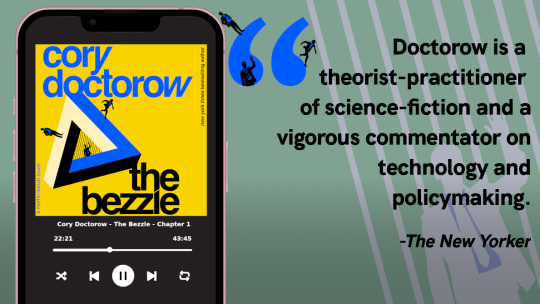
Back the Kickstarter for the audiobook of The Bezzle here!

Image: Drahtlos (modified) https://commons.wikimedia.org/wiki/File:Motherboard_Intel_386.jpg
CC BY-SA 4.0 https://creativecommons.org/licenses/by-sa/4.0/deed.en
-
cdessums (modified) https://commons.wikimedia.org/wiki/File:Monsoon_Season_Flagstaff_AZ_clouds_storm.jpg
CC BY-SA 2.0 https://creativecommons.org/licenses/by-sa/2.0/deed.en
404 notes
·
View notes
Text
The Overlapped AU [Aka Superhumans disguisted as Dinner Theater workers]
The Owners
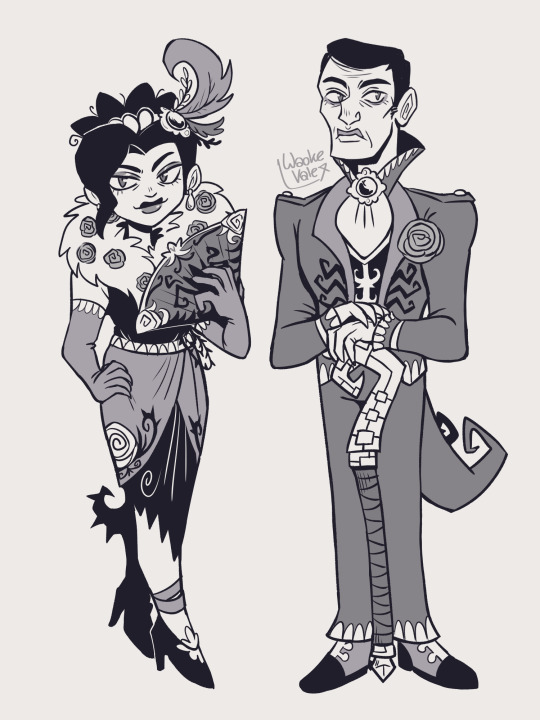
The Managers (Engineer & the HR person)

The Waiters
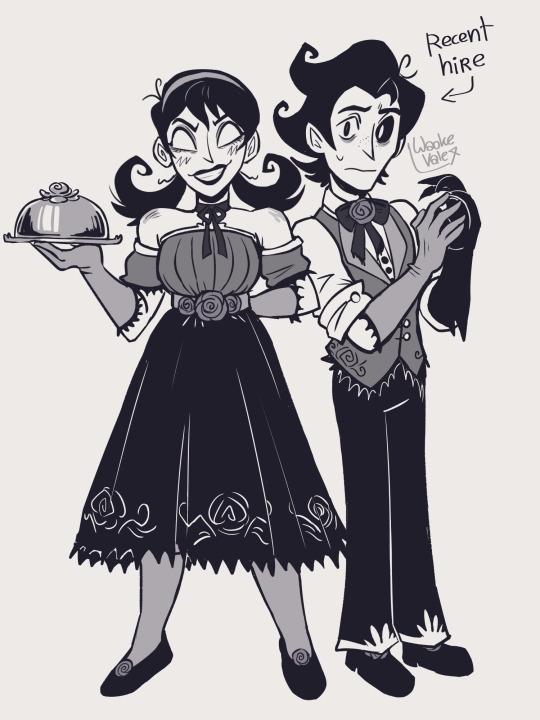
The Security
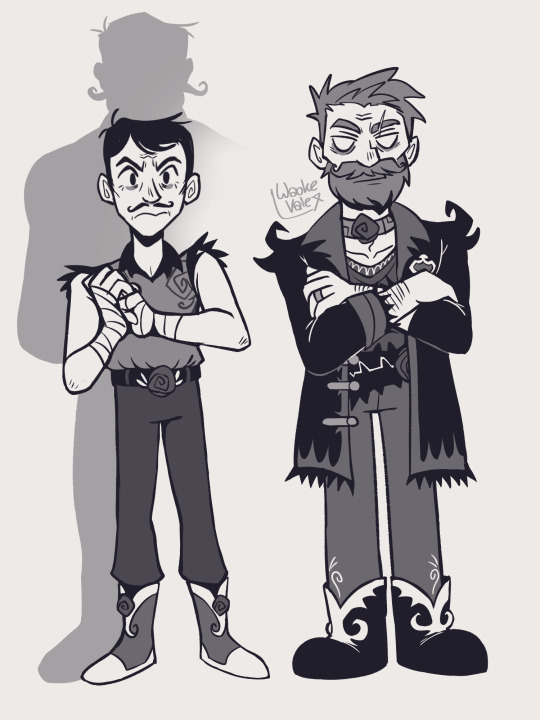
The Performers (Wes is mostly on cleaning duty though)

The Kitchen staff (the others are usually tasked to help, though very few are actually trusted at all times to be there)
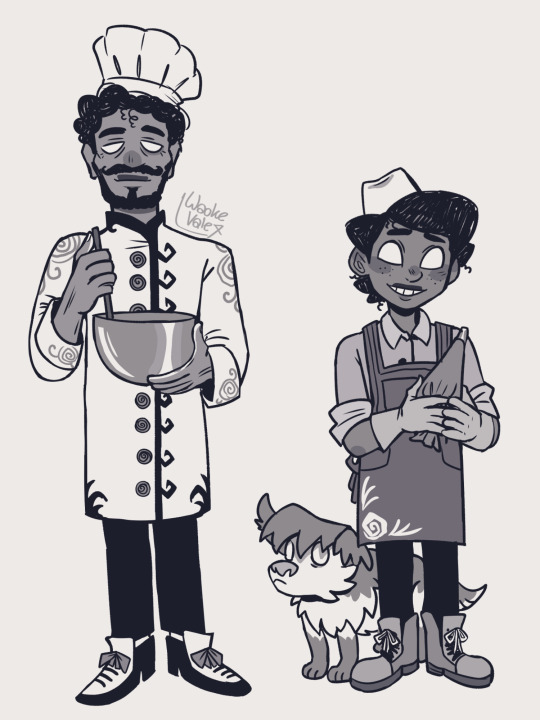
The Bartender and the Host
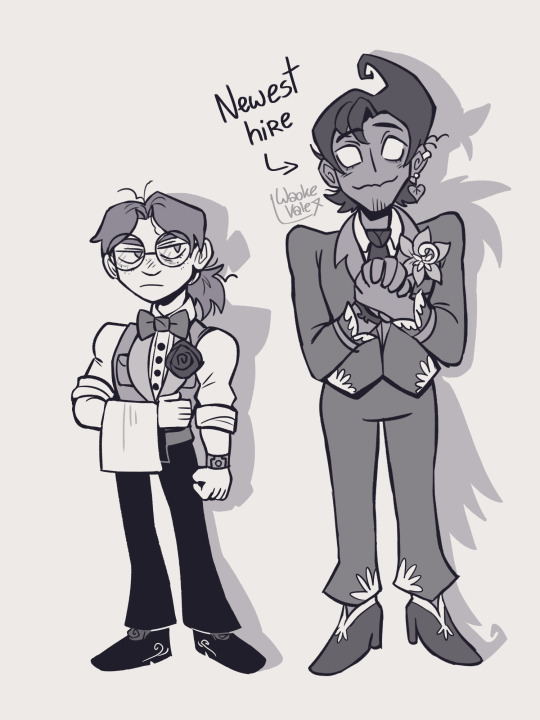
The Dishwashers
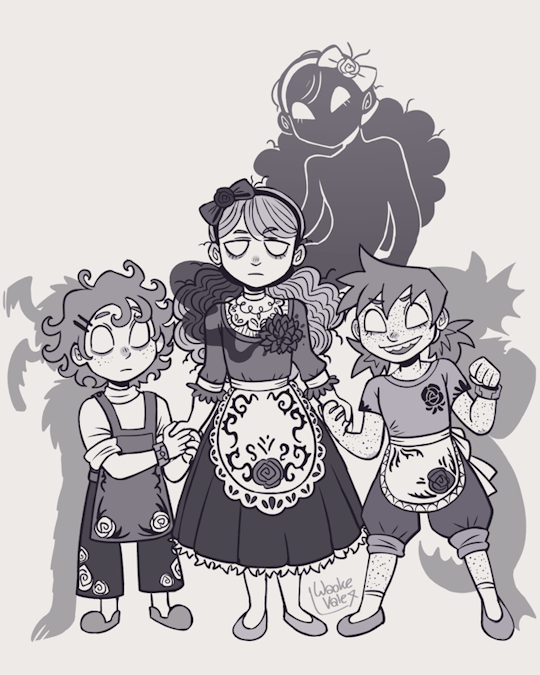
The Clerk & The Supplier

So this AU came to me upon a dream, and I just had to make it real...
The synopsis below:
The event of April 17th 1906 does happen, however instead of Charlie and Maxwell being kidnapped into the Constant, the Constant overlaps with the real world and spreads itself onto Earth.
Charlie and Maxwell in the process become corrupted and have to hide away temporarily. Both of them soon began to hear strange voices, source of which neither is quite sure, telling them, compelling them to hide the corruption's effect from the publicity, for the time being.
They come to a mutual realization they have to fix this mess somehow and hunt down any and all corrupted by the tome, by any means necessary.
(Maxwell still has codex umbra, but it is sealed shut for the time being until he's sure it won't spread more if Their influence. )
But the corruption didn't just appear out of nowhere, it's been leaking way long before Maxwell found the Codex, if to a less prominent extent.
Thus, in few years passing, they form a Dinner Theater, a rather inconspicuous establishment from the first glance. Very quickly they began "hiring" employees, which in reality means tracking down and blackmailing those who have been corrupted but not fully lost themselves to its effects, in order to hunt those who had.
Winona was against the idea at first, as she found out. But seeing the effects of corruption first hand, she quickly had a change of heart and integrated herself into Charlie's new environment.
Eventually they gathered a rather generous amount of people. Once a person's proven to be trustworthy to a point, they're give higher positions in the company.
However those who aren't, are likely to be shunned or "fired" which...you could probably guess what that means.
Many of these people gradually come to terms with the reality of their situation and accept their newfound purpose, being thankful that at least they still have a roof over their head and a warm meal, instead of being viewed as monsters or outcasts to the greater society.
(Wilson though, can't quite accept this notion. He keeps claiming that "this is just a big misunderstanding, I'm just a normal guy!" Yet the truth could be far from it.)
When Maxwell and Charlie hear of the danger looming, they immediately inform their "staff" of the matter. Those who are more experienced in combat come along to face whatever opponent may cross them, while those who aren't, stay behind, to be an additional aid or a medic in case the battle gets too intense.
Whenever any suspicion arises in the town about the shady business going on in that particular building, the two owners alongside their employees practically gaslight anyone and everyone into believing they're but the most regular entertainment center.
The characters who have either willingly or unwillingly lost their humanity, mostly in the physical sense, are given special devices constructed of Thulecite and bits of nightmare fuel (made by Winona, Wicker and the main two), which effectively hide away their true identity, or surpress the effects of their ailment.
There's also a few other people important to this story, especially the One, which even Charlie and Maxwell refer to as "The Boss", though what many most recent hires don't know, is that there's someone who's in a position much higher than the owners themselves, controlling their every move.
Correlating to that, another person, or rather, a set of people per se, working for a much different cause. Though most of them are "people" in only a visual sense of the word.
And while, there might be someone inside the well-known around town diner, who just might be more than what appears on the surface, literally and metaphorically this time.
__________
If you're interested to learn more about this AU, do let me know. If you have any questions, I'm happy to hear and answer them!
#dst#don't starve#don't starve together#dst au#dst charlie#dst maxwell#dst wilson#dst willow#dst winona#dst wickerbottom#dst wolfgang#dst woodie#dst wes#dst wigfrid#dst wx78#dst woodrow#dst wormwood#dst wendy#dst webber#dst wurt#dst wortox#dst wanda#dst walter#dst warly#dst abigail#the overlapped au
661 notes
·
View notes
Note
ermmmm like i dunno if you're still doing requests buttt could you do like kustard but it turns to dustard
that dynamic always interested me but i never see much about it :3
anon, has anyone ever told you that you're a genius?
the kustard to dustard pipeline is WOEFULLY UNEXPLORED. WHICH SUCKS BECAUSE IT'S SO FUCKING GOOD. so, naturally, i was REALLY excited when i got this ask. yippie!!! an excuse to write fun fucked up dynamics!!!!!
this one is pretty tame. i can't think of any warnings you might need other than it being like..... long and, obviously, kinda angsty. it's fluffy in the end tho. but that's what you get when you ask me to write i guess LOL
thank you all for the requests btw!! i was NOT expecting so many after the kist fic, but i am pleasantly surprised and am trying to chip away at them as quickly as i can. spat this one out in a few hours, so it might not be my best work, but i'm happy with how it turned out either way :)
as always, the link to this fic on ao3 will be in the reblogs once it's posted, if that's your cup of tea (as it is mine LMAO)
i hope this feeds you well anon. thank you for the ask <3
-----------------------------------------------------------------------------
It was undeniable that the multiverse was an entirely cruel and ruthless place.
Or, at least, that was what Red had wholeheartedly believed up until he’d met his other self, in a universe that was so very unlike his own. A universe where the typical LOVE of any given passerby was nothing higher than 1; where Sans and his brother were kind to one another in public; where there was so little need for the royal guard that the worst Sans got for sneaking off to Grillby’s during his shift was a slap on the wrist. It was difficult to believe that a place like that could exist – that it could be self-sustainable, since, logically, their weakness should have led to their downfall – and even harder to look at it as anything more than a childish fantasy that had yet to find its catch.
Initially, Red hated Sans.
It felt ridiculous, looking back upon it – in the moments when his head lay in Sans’ lap and gentle fingers traced over his scars like they were poetry written in a language Red had never bothered to learn, and he wondered what Sans saw in him that he hadn’t seen; wondered if this was what it felt like to love himself – but it was the truth. It had taken him a while to understand that the circumstances in which they’d grown were enough to turn them into two different people; that hating Sans wasn’t so much like hating himself, or what he could have been, as he wanted it to be.
Really, Sans was so unsuspecting that Red had been foolish enough to let his guard down, forgetting that then was when feeling was the most liable to appear.
He hadn’t expected to fall in love with the laugh – genuine, unabashed, and lacking all of the gruffness of his own – of someone whose humour was just as terrible as his own.
He’d been far too blind to realise how incredibly endearing it was for someone to wake up and allow themselves to be bleary and half-asleep, cuddling into his arm without even meaning to, even if it meant opening themselves up to being easily picked off.
In allowing someone into his blindspot that he’d believed to be too weak or foolish to use it against him, he’d failed to remember that it was the softest words that cut the deepest, when they would bleed him dry so tenderly and lovingly that he couldn’t even think to fight against the bloodloss; when, instead, he’d lean into the knife and ask them to twist it. The wound was soul deep, and the soul’s wounds could not be so easily ignored.
Though, it was a small price to pay to hear that raucous laughter over jokes that weren’t even funny. Trivial, really, in comparison to soft smiles and gentle touches that moved slowly just to prove to him how tender the world could really be.
“Earth to Red.”
A soul for a soul; a life for a life. They gave one another all of themselves, promised each other that it was enough, and it was. For once, it was, just to be soft.
“Come in, Red.”
There was gentleness in the multiverse, hidden until it was allowed in.
Tiredly, he bat away the hand that waved in front of his sockets, only to grab it by the wrist and pull it back down, firmly, on the crown of his skull. With a laugh, the fingers scratched gentle circles into the bone, and Red hummed happily at the feeling, allowing his sockets to slip shut as he lay against Sans’ legs.
“Where’d you go, space cadet?”
“Nowhere,” he grumbled, sighing softly as he fully relaxed into the touch. “Must’ve dozed off.”
Again, there was that laugh, and Red’s soul fluttered. “With your eyes open?”
“It’s a little known talent of mine,” he hummed.
“Gee, must be handy,” came the response, and amusement never sounded so beautiful. “You’ll have to teach me sometime.”
“Nuh uh,” and he couldn’t stop himself from snorting. “It’s genetic.”
“Ah, damn. Guess we gotta add that to the list of differences.”
“Guess so.” His breath hitched as the hand on his head trailed downward to cup his cheek. His browbones furrowed, ever so slightly, and he felt himself go tense.
“Hey. Look at me.”
After a moment, Red opened his sockets, and there was no sight more welcome than the face of his lover. Each time he saw him was like the first, and Red drank in each of his features as if they’d disappear at any moment: smooth bone, unmarred by chips and cracks; eyelights that glowed softly in dark sockets, like how he imagined fireflies might; ever present, gentle smile that smoothed away his worries. Oh, to be so untouched by cruelty. He’d do anything to keep it that way.
“‘Sup,” he breathed, and Sans’ smile widened as he snorted.
“‘Sup,” he returned. His thumb ran circles over his cheek, and Red leaned into the touch. “You okay?”
With a snicker, he rolled his eyelights at the question. “Super duper.”
Despite himself, Sans laughed too, but, still, pressed on. “You sure? You were spacing out pretty bad before. Like, way out in deep space,” he emphasised, unnecessarily. “No planets around, just stars. Way beyond our galaxy. Uncharted territory. Where no man has gone before.”
“Alright, alright, I get the picture” Red interrupted, though not without chuckling. “‘M okay. Was just thinking.”
When Sans’ head cocked to the side, Red couldn’t help but grin. “About?”
“Uranus.”
At first, his sockets simply narrowed, confused, then all at once, “Ura– Oh. Alright, perv. Har har.”
But, he was laughing, and Red was, too, like it was the funniest joke in the world despite it not even being funny. Maybe it didn’t matter, if Red was the one to say it; if Sans was the one to laugh. Maybe, then, it could be good, even if it wasn’t, really. The sound of their laughter, something shared and sacred, was what Red imagined it might feel like to hear the birds chirp when the sun rose and turned the sky whatever colours it was supposed to when it drove the night away. He hoped that it was blue, like Sans’ favourite colour, but the pictures in his textbooks were too faded to be sure.
When he tuned back in, the laughter had tapered off.
“You do that a lot, y’know,” Sans noted, almost absentmindedly, and his hands turned back to trailing shapes on Red’s skull.
He grunted at the feeling. “Do what?”
“Go to space,” Sans said, simply. “Or… somewhere else. That I can’t reach.”
Red frowned, closing his sockets to cut off the dull thrum of agony he felt in his soul whenever Sans’ smile didn’t reach his eyes like that. “I do it less than I used to. It used to be better, somewhere else – anywhere else – but ‘m not so sure anymore.”
“Where would you wanna go?” he asked, in a whisper. “If you could go anywhere. Anywhere at all.”
For a moment, Red considered. The answer would have been easy before – the surface, of course. Where Paps and every other monster longed to be – but access to the multiverse had opened up options that he’d never known existed. If he could conceive of a place, it surely existed, somewhere. Any place. Anywhere. Anywhere at all. But, if kindness was so thoroughly hidden, why should he want to look for it anywhere else?
“Think I’d rather just stay here,” he hummed. “With you.”
Maybe he should have questioned the way that Sans’ hands stilled at his answer. Maybe he should have opened his eyes; looked at his face; seen his expression; known what it meant.
But, he didn’t.
“Geez,” Sans breathed, with a laugh that sounded breathless. “My answer feels stupid in comparison.”
“Yeah? What’s yours?”
“Anywhere else. Anywhere at all.”
In hindsight, Red should have known it was too good to last; too good to stay good.
A universe where the typical LOVE of any given passerby was nothing higher than 1; where Sans and his brother were kind to one another in public; where there was so little need for the royal guard that the worst Sans got for sneaking off to Grillby’s during his shift was a slap on the wrist. It was difficult to believe that a place like that could exist – that it could be self-sustainable, since, logically, their weakness should have led to their downfall – and even harder to look at it as anything more than a childish fantasy that had yet to find its catch.
Of course, there was a catch.
There was always a catch. Every childish fantasy grew tainted with time, like the innocence of children was stripped with age. Every fairy tale book grew weary and old, pages yellowed and frayed. Every picture faded, until you couldn’t be sure whether the sky was blue or grey.
But, you hoped it was blue anyway, and maybe that was your mistake.
It was undeniable that the multiverse was an entirely cruel and ruthless place. That was what Red wholeheartedly believed. Maybe, after all, there was a reason that love and LOVE were spelled the same.
Try as he might, though, Red could not hate him.
It felt ridiculous – in the moments when hands clamped around his neck like a vice, choked by the grip and the grief that came with it, as if the two were one in the same, and they would both cry, both tremble in fear, or fury, or something worse, and Red would think that this was what it was like to hate himself – but it was the truth. It had taken him a while to understand that the circumstances in which they’d changed were enough to turn them into two different people; that hating Dust wasn’t so much like loving himself, or what he could have been, as he wanted it to be.
Really, Red had underestimated Dust as he had been before; had assumed that kindness meant the incapacity for cruelty.
And, in allowing someone into his blindspot that he’d believed to be too weak or foolish to use it against him, he’d failed to remember that it was the softest words that cut the deepest, when they would leave scars so deep that all he could think of was how much he missed the feeling; when he’d search for the knife and throw himself against it. The wound was soul deep, and the soul’s wounds could not be so easily ignored.
Before, he’d thought it was a small price to pay. Trivial, really, in comparison to what he had to gain from it. As if it were a simple transaction as opposed to something living, and breathing, and ever changing; as if he would never have to be the one who was tender; as if that made it anything less valuable.
“Red.”
A soul for a soul; a life for a life. They gave one another all of themselves, promised each other that it was enough, and it was. Just as before, it was. Harsher now, but Dust had taught Red to be soft, and Red would teach him what he’d forgotten.
“Red.”
There was gentleness in the multiverse, hidden until it was allowed in.
With a jolt, he came back to reality to a slap on the face, not hard enough to hurt, but more than enough to be startling. He frowned, but, nonetheless, took his hand by the wrist and guided it to the crown of his skull. Hesitantly, as if spurred on by some muscle memory, the fingers ran in gentle circles across his bone, and Red hummed in approval at the feeling as he lay against Dust’s legs.
“Where’d you go?”
“Nowhere,” he mumbled, unconsciously leaning into the touch. “Must’ve dozed off.”
“With your eyes open,” Dust said, and it wasn’t a question. “Freak.”
Immediately, Red snorted. “Guess we gotta add that to the list of similarities.”
Despite himself, Dust laughed; the sound short, subdued, and nothing like the laugh he’d fallen in love with, but something about it made his soul flutter, nonetheless. “Guess so.”
After a moment, Red opened his sockets. Each time he saw him was like the first, and Red drank in each of his features as if they’d disappear at any moment – as they had before – smooth bone that crackled and buzzed with magic, refusing to be underestimated; eyelights that glowed brightly in dark sockets, like how he imagined neon signs would on a city street in the middle of the night; a face shrouded by shadow, as if it was saved for him alone to see. In the end, he’d been marred by cruelty despite Red’s best efforts, but he was beautiful nonetheless.
“‘Sup,” Dust mumbled, and the edges of his mouth quirked up in an attempt at a smile.
Slowly, Red lifted his hand and, ever so gently, cupped Dust’s cheek, pausing when his breath hitched, but, with the same caution, Dust leaned into the touch; barely enough to be noticed, but Red noticed. This time, he saw. “‘Sup,” he finally returned. “You okay?”
“You’re going to disappear,” Dust whispered, and his voice broke on the words in a way that made Red feel hollowed out. “You’re going to go somewhere else. Somewhere that I can’t reach. Like you do when you go to space. It scares me.”
Browbones furrowed, Red ran gentle circles across his love’s cheek, staying silent as Dust took in a shuddering breath to continue; a quirk Red had grown accustomed to.
“I remember what you told me before,” he said, and his hand came up to desperately hold Red’s to his face, like he might forget it was there if he didn’t make sure. “That you did it because it was better to be somewhere else – anywhere else. Do you want that now? To be somewhere else? Away from me?”
“No,” Red said, and the lack of hesitation in his answer surprised even himself. “I don’t want that.”
Again, Dust’s breath hitched, and he frowned, like the answer wasn’t enough, and, maybe, it wasn’t. His fingers threaded between Red’s, and, when he clutched onto his hand, Red squeezed back, holding him with desperation to match. Dust laughed, a breathless sound. “I’m not the person that you loved.”
Scoffing, Red rolled his eyelights at the notion. “Of course you are.”
“I’m not,” Dust insisted, and something about it was a plea.
“Then,” he breathed, “I love you. This you.”
And, with a breath that was cut off with something that sounded suspiciously like a sob, Dust leaned forward – over Red’s body, as if to trap him – and pressed his chest against Red’s. His ribs fluttered with each breath, and Red guided his stuttering breaths with deep inhales that interlocked their ribs with each one. His hand remained stuck to Dust’s cheek, and he squeezed gently, relieved when Dust squeezed back to let him know he was still here; in this reality, not another.
“Breathe,” Red commanded, soft; soft, like he’d been taught. “I’m here.”
Dust took a heaving breath – deep, frantic, like he’d been drowning – and, in a voice that sounded so much like before – reminding Red once more that this was the person he loved, despite the change – he whispered, “Where would you wanna go? If you could go anywhere. Anywhere at all.”
The question made him sputter, for a moment. Then, with a breathless laugh, “Seriously?”
“Please,” he pleaded, so what could Red do but answer?
The answer would have been easy before – here; here, just like before – but, despite how they fought against it, things had changed. Did that mean his answer had to change? That his longing had to shift, too? The multiverse was infinite. If he could conceive of a place, it surely existed, somewhere. Maybe even somewhere that Sans stayed Sans, but would it be the same? Any place. Anywhere. Anywhere at all. But, if kindness was so thoroughly hidden – had been ripped from Dust’s grasp with the signature ruthlessness of the multiverse – then why shouldn’t Red be it? Like Dust had been for him, before.
“Think I’d like to stay here,” he hummed. “With you. Still.”
And, this time, Red noticed the way that Dust’s breathing slowed to a stop; felt the way that his magic crackled between his joints; how something wet slipped between their fingers on Dust’s cheek; knew what it meant.
“Okay,” Dust whispered.
“What about you? Where would you go?”
There was a pause – a moment as Dust inhaled once more; held Red’s hand tight, but oh, so gentle – before he managed to answer. “Here,” he said. “With you.”
#blaise writes#fanfiction#undertale#undertale au#sans#sans au#underfell#fell x classic#fell x dust#kustard#dustard#dust sans#dusttale#fell sans#undertale fanfiction#utmv#sanscest#angst#good lord#i speedran this bitch#it's 7 am and i have not slept#but i'd do it again
160 notes
·
View notes
Text
Tony’s Childhood. Part 2.1. Effects: Own Will
Before this part, be sure to read Part 1.
If you're not aware of Tony's strange understanding of the importance of his own wants and needs, check out this post from daydreamsandnightlights.
Here I will try to explain the roots of this behavior.
At age 4 Tony built his first circuit board (IM1)
At age 6 built his first engine (IM1)
Let's think about what it meant that he built all these things at such an early age. Was this his own or his father's will?
Let’s take Morgan for comparison – she is indeed a brilliant kid too, since at the age of 5 she can count up to 3000 (ordinary kids count up to 1000 at the age of 8), knows how much is in a ton, what “disintegrate” means and can easily manipulate her dad, a genius.
Looking at Morgan's behavior, we can assume that she is already capable of building a circuit board under the guidance of her father. But she doesn't. Because her father does not demand this from her. She is a kid. She plays with plush dogs and beavers, sleds on Captain America’s shield, and likes to have bedtime stories read to her before bed. She sneaks into her father’s garage because there are interesting things inside that she can take and play with, not to build something and add it to the list of impressive achievements.
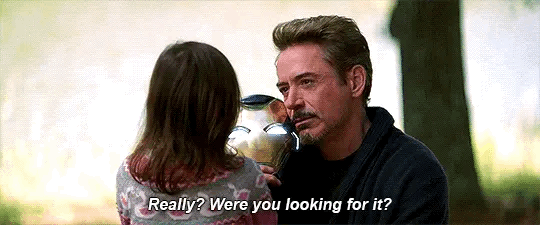
The question is: did Tony want to create things because he liked it, or because his father did it and wanted his son to do the same?
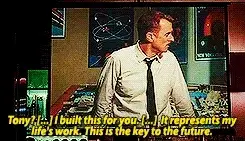
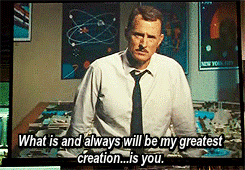
We know that Howard had plans for Tony to "change the world" with Howard's ideas about the future. Apparently, he was preparing Tony for this purpose.
Do small children have a desire to tinker and build things? Some yes. Do they want to or should they play with cubes and constructor sets? Yes. Do they want to or should they work with real motorcycle engines and soldering irons? Hell no. They usually don't have the appropriate motor skills to do this, so they can easily hurt themselves. I'll talk more about this later when I discuss his pain tolerance.
I think it’s impossible to say now whether Tony was interested in engineering from that age (I mean sincere desire, not ability). So we cannot answer that question. But I doubt 4-year-old Tony realized what he was doing when building computer parts. He liked it though. Because those were probably the only times he spent time with his father.
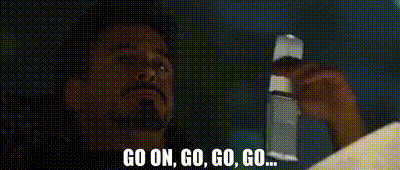
Howard continued to deny his son his will when Tony was sent to boarding school when Tony was 7 years old. There he had a regulated, planned life for 7 years. Then college for another 7. And then became the youngest CEO at 21. None of this sounds like a child’s “I did what I wanted”.
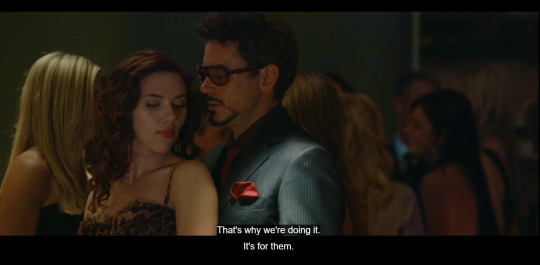
He did not express his will but pleased others. Because this way he received a little love. Or a substitute for love, to be precise. And when, perhaps for the first time, he was taken care of by Yinsen, who saved him, even in such a terrible way, and died for him, he was incredibly grateful. And after that, his attitude towards people changed.

But not the attitude of people towards him, since they continued to want something from him, expecting the same behavior that they were used to seeing from the “rich and famous”.
*Doesn’t want to celebrate his birthday with a bunch of strangers in his house? Wants to spend his last days with the woman he loves? DENIED*
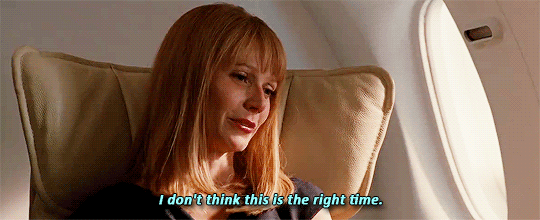


*Needs psychological support from people he trusts? DENIED*



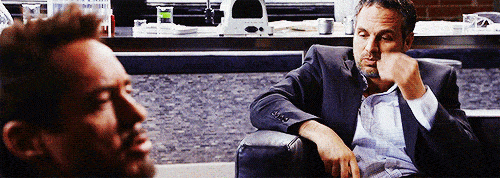

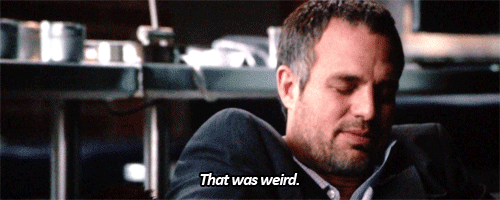
*Wants to save the team from a breakup because he cares and knows what’s coming? DENIED*
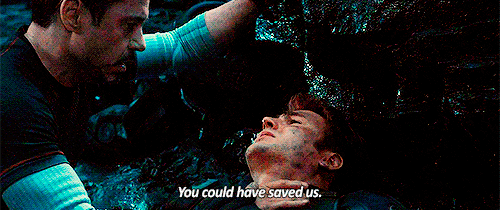
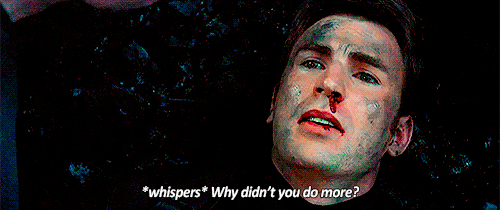

Conclusion: Tony didn't belong to himself his whole life. He didn’t use to defend his own, laid deep within, interests. First, his will was moved aside by his father’s. Then Stane’s and the public’s. Fury then came with his Initiative without asking what Tony wanted. Then S.H.I.E.L.D. came to him (not) asking to find Tesseract and save the world. Then the whole team came. Then the government with its Accords, and so on and so forth. None of them bothered to ask, “What do you want, Tony?”. And the only times he insisted on something, were the times when he tried to keep the team together and prevent their death.
#tony stark#iron man#marvel#mcu#the avengers#captain america civil war#avengers age of ultron#iron man 3#pepper potts#avengers endgame#captain america#morgan stark#psychology#iron man 2#howard stark
169 notes
·
View notes
Text
something i've been thinking about post-portal fiddauthor
this could entirely be something i've just missed people discussing, but i haven't seen anyone mention before how this motel:
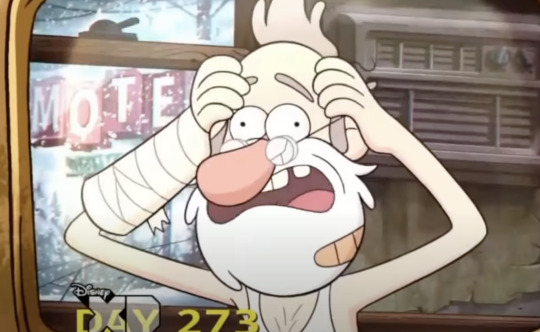
(presumably the place fiddleford relocates to after being kicked from the blind eye and having his memories taken)
is incredibly similar to the only other motel we see mentioned in the journal:
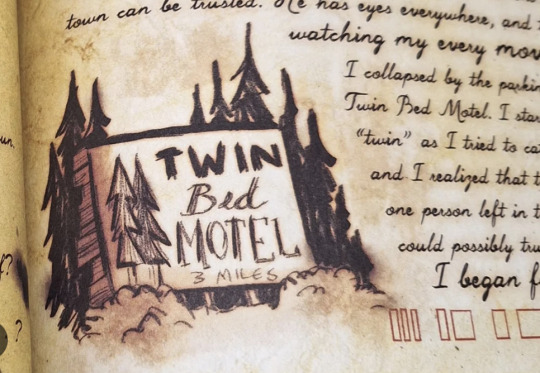
arguably twin bed motel is just a reference to twin peaks, or back to the future, or just the twins themselves, but honestly? the two seem like they could be the same motel. they're both out in the woods, surrounded by forest (presumably near route 14 and the truck stop ford has been frequenting) with pine tree motifs, and they're both out there in the snow. ford stays there for one night multiple weeks after the portal incident, sometime at the end of january or start of february, and fiddleford is there somewhere between day 189 and day 273.
that might seem like it puts a bit of a wrench in it, because it seems like fiddleford couldn't have been there at the same time if it has been 273 days since the portal incident, but this just adds to the theory that fiddleford is lying in his initial video diary and is filming the first four entries while still working with ford (which i want to make a post about if anyone is interested, i have a lot of evidence). so, with that theory, it is plausible that they are at this same motel at the same time, especially when you consider that neither ford nor fidd have a car at this point. ford's was destroyed shortly after he moved to GF by steve, and he seems to travel solely on foot since then, and fiddleford assumedly stops driving after day 189 when he accidentally hits another car on the road and breaks his arm. how many motels are accessible on foot in this area in the snow?
so two men, both tormented and driven to their limit by the same creature, the same project, unable to escape very far without transport end up in the same motel for one night weeks after their partnership fell apart. ford doesn't even make it inside, he collapses in the parking lot staring at the sign, thinking of the only person in the world who he could trust anymore. he says it himself, "F is nowhere to be found", "if only i had listened to him when i had the chance", but in reality fiddleford was metres away, holed up in a dingy room he rented with the last of his money, driving himself mad with paranoia.
the worst part is arguably that the video diary that takes place in the motel is the first one where we see the start of mcgucket vs fiddleford. his voice is pitchy and anxious, he's rambling about seeing something he didn't understand, he's hunched and scared and tearing out his own hair. he's stopped using the gun, most likely having been thrown out of the blind eye by now, but his mind is gone for good and he's continuing to decline without even using it. if ford had known F was there, just behind a door, and tried to see him, he wouldn't have seen the man he knew. at this point, fiddleford was gone either way. he would have been completely unrecognisable.
in another universe did he find him? did fiddleford see him through the window and try to place where he knew this man's face from, why his chest hurt so badly looking at him slumped over outside his window? did they figure it out instead of slipping past eachother again?
just like the few moments he spent with stanley before the accident, he fumbles and blanks the people around him without even trying, and fails to see past his own goals into how they affect others. he doesn't understand stan's anger at being sent away again, doesn't see fiddleford's collapse even though he's seemingly become known in the community for his very public deterioration, destroys the possibility of anyone "understanding what he's up against" because time and time again he doesn't tell them.
he believes that he needs to keep this information to himself, save the research even though its dangerous, stop others from knowing or they might steal it, but at the same time he needs help so badly and he needs stan and fidd to finish his plans, both to build the portal and to stop bill. but he lets them walk in blind every time, refusing to share what he knows, all under the name of that sly piece of advice bill gave him, "trust no-one." even though, what bill really meant is "trust no-one but me".
arguably it's the same habit which leads to weirdmaggeddon, he doesn't tell anyone but dipper, the child he sees himself in, about the rift or about the truth of his relationship with bill. if mabel knew, she would never have given bill the rift, or felt left out enough to run and be vulnerable, which lends so much more to his character post-BOB, where he's finally opening up to the people around him. he's reunited with his family and fidd, they all know his embarrassing secrets and the things he tried to hide about himself, about him and bill. and it's okay. if anything it makes him more human, more flawed but more relatable. and at the end of it all, F is there, as forgiving and kind and understanding as he always has been, with no door in the way this time.
#eden rambles#gravity falls#thisisnotawebsitedotcom#fiddauthor#fiddleford mcgucket#stanford pines#i love him pls dont take this as character criticism i love him for his flaws#and i love fidd for his everything#meta#gravity falls meta#billford
119 notes
·
View notes
Note
I've been looking back at your rambles about Fresh again and I wanted to ask for if you have any thoughts about 2.0 and esp about the like, if the threat of potential replacement was real even if 2.0 didn't understand how it worked- because I don't think that realistically "we" the people watching would replace Fresh for having feelings, but I do sometimes wonder if maybe you could interpret future versions of Fresh as... Who knows, maybe 2.0 DID win. Maybe even he was replaced eventually too
OHHH ANON I HAVE SO MANY THOUGHTS ON THIS I HAVE TO CHOP MY REPLY UP INTO TWO POSTS. YOUR BRAIN IS MASSIVE (ALSO AAHH IT MEANS THE WORLD TO ME THAT PPL LIKE MY ANALYSIS!!! i love these goobers and their dynamic i need to share them with the world <3)
dude something so genuinely. interestin to me about the idea of 2.0 replacing fresh? nobody else in the multiverse would ever know. he acts the same, looks the same, talks the same, and since he was watchin 1.0 the whole time with the higher ups? he could easily fake having all of fresh’s memories without even breakin a sweat!
it’s never been specified if any other outcodes know about fresh’s whole thing, whether the higher-ups and general ‘creators’ are different in the context of the story or if it’s all just us, and since fresh keeps every single thing, every single ‘vulnerability’ and all facts abt his life that aren’t SICKNASTY COOL RADICAL SWAGGY!!! insanely close to his chest (except for one scenario we know of, pacifrisk + possibly some of those at loveball i don’t have the full logs </3) (p.s. 2.0 called pacifrisk 1.0’s sibling in a mocking way AND IT MAKES ME WAUH :( they were like siblings,,) nobody would just. ever know, unless 2.0 told them directly.
bc 2.0 is such a good actor, it’d take someone intimately familiar and close with 1.0 to spot any of the minuscule differences or cracks in his facade that couldn’t just be chalked up to.. fresh bein fresh, unpredictable and WACKY and weird and ever-changing (tho he’s actually way more predictable than he thinks, when emotions aren’t involved) and that thought makes me CRAZY.
1.0’s worst fears coming true and he takes it all to his grave to be replaced by one of only ones he could truly hate with his limited emotions, a copy of himself. and so the snake eats its own tail and the cycle continues, repeating on and on and on, fresh 3.0, fresh 4.0, the same song and dance of fixing the mistakes of the last before succumbing, messing up in one way or another. 5.0, 6.0, 7.0, 8.0, the metaphorical blood of their predecessors marking every step they take, forced to follow the steps to the letter. be more brutal, more funny, corrupt worlds faster and faster, never, ever stop to rest, or you’ll end up like those before you, waiting for the next wearing your face and name. knowing the limits more than anyone, their gods demanding perfection, no more, no less.
until the last higher-ups get bored, or decide to move onto something, someone new. no peace, no ‘justice,’ no mercy. and so it goes, and so it goes.
anyways since fresh 1.0 has 1990s furbies fresh 2.0 should have a 2006 purple funky furby he takes everywhere especially since the funky furby has a semi similar level of ridiculous rarity that fresh 1.0’s signature kid cuisine furby has IN THIS ESSAY,
(fresh 2.0 2005 furby manifesto under the cut! I'M DOIN IT!! and then it got very sad for him because i got carried away AGAIN uh oh,)

look at this little guy this is 2.0 all over!!!
also the 2005 furbies being made to replace the 1990s furbies once their sales were waning and keep up on current trends (specifically furreal friends at the time!) only to be discontinued and scrapped only a year or two into production.. and most people nowadays remember and love the first though technically less 'advanced' version of the furbies. while 2005s tend to be overlooked by the public at large as just a cliffnote. the metaphors write themselves bro!!!
they're also generally a lot more fragile (mostly based on my little black and white fellow from personal experience) than the original older furbies! their beaks are covered with rubber that degrades and rips very easily over time vs the original yellow plastic beaks, and they can move and stomp their feet vs the nonmoving fabric paws but those also have a tendency to break off! my 2005 boy is missin one of his feet and his beak rubber is gone but i love him..... his name is gizmo (because i was obsessed with both furbies and Gremlins (1984) as a kid) but ANYWAYS,
THE IDEA OF 2.0 actually breakin way more quickly than fresh 1.0 is smth i literally didn't think about until right this second but oh my god that's so compelling to me. idea - he thought he was better, immune to making the same mistakes, tying his self-worth to being BETTER than his predecessor - but when he crashes hard, he absolutely panics. he knows what he has to do, he knows he has to fix himself as fast as possible, he knows his deadline is coming soon and he's going to meet the same fate as the version of himself he gleefully replaced.
but his anxiety and frantic tries to prove he's still useful only make the fact that he's falling apart all the more obvious!! while he tries to push himself harder and harder! while in the weird limbo of refusing to admit to himself how bad his emotions and emotional spiral is becoming, because acknowledging it would open the floodgates and he'd break down completely - plus, look at what happened to 1.0 when he admitted his weakness! but on the other hand, he's struggling for his life to keep going on as if everything is fine in the face of absolute overwhelming terror, sadness felt for the first time, misery, unable to concentrate as his mind is rebelling against him, slipping up and tripping over his words as he tries to put up the image of the perfect parasite he was made to be.
look, see, he's trying! he's fixing it, he's going to make it better! just give him a little more time, please, just a little longer! he can fix it, he can fix himself, he's different, he can fix all the problems he's caused, he just needs a little more time.
should he run? can he ever escape from his creators, those fickle things practically his gods? where in the multiverse can he go that he wouldn't find himself? who would take him in? 2.0 cries for the first time, that day, and it sinks in that there's truly no going back.
some nights, jolting awake, chest heaving, 2.0 swears he can hear the echos of 1.0 laughing at him. fresh was right, after all. 2.0 really wasn't any better than him.
#THE SECOND HALF OF THIS POST INCOMIN EVENTUALLY!!!#fresh sans#fresh!sans#underfresh#utmv#lucidia#fresh analysis#freshposting#fresh 2.0#ASK 2 TAG#BOTH PARTS GOT A LIL HEAVY#chat#IN MY HEART both fresh and 2.0 are somehow happy and in therapy and holdin hands and spinnin around in circles#IN THE INFINITE MULTIVERSE ALL UNIVERSES ARE 'CANON' SO THIS IS TRUE#THANK U ANON B:D !!!#anon
52 notes
·
View notes
Text
Lisa Needham at Public Notice:
You’re forgiven for forgetting about TikTok for the last couple of days, what with the horrorshow avalanche of executive orders and gleeful deployment of Nazi salutes (plural!) from the world’s richest man. Nonetheless, TikTok is ostensibly banned in the United States as Democrats and Republicans overwhelmingly voted only nine months ago to outlaw the app unless its parent company, ByteDance, agreed to sell it. The US Supreme Court even upheld the law just last week. However, TikTok lives, thanks to the whims of Donald Trump, the same person who, in August 2020, issued an executive order giving ByteDance 45 days to sell the app or see it banned. Trump has been extremely transparent that he flip-flopped on TikTok because the app helped him win the election last year, in part because it became a hotbed for criticism of Biden’s support for Israel. “We won young people and I think that's a big credit to TikTok,” Trump told Newsmax earlier this month (even though he in fact lost the youth vote). “So I'm not opposed to TikTok ... I had a very good experience with TikTok." Lost in the current discourse about TikTok is an important conversation about whether it violates the First Amendment to ban a social media app based on national security concerns about its Chinese-owned parent company. Also lost is a debate about whether it’s fair to single out TikTok over worries about user privacy, data harvesting, and manipulative algorithms when such issues are common to all social media platforms. There’s also a discussion to be had about whether singling out TikTok is racist — though there’s a good argument it is. Instead, what’s happening here is the creeping oligarchy of companies and capital aligning around an authoritarian president, with everyone fully aware that sucking up to Trump personally, ideally along with staggering sums of cash, is the only way to evade scrutiny.
[...]
The art of the deal
To be scrupulously fair to Trump, he isn’t the only person who reversed course on TikTok. Once it was clear that the public opposed the ban and that the Supreme Court might not step in to save legislators from themselves, the Biden administration spent last week trying to figure out how to keep TikTok alive. Massachusetts Democratic Sen. Edward Markey introduced legislation to delay by 270 days the initial January 19 deadline for TikTok to be sold, despite having voted for the ban in the first place. The problem these efforts faced, however, is that TikTok wasn’t interested in working with the Biden administration or Senate Democrats to fix the problem. And why would they be, when Democrats are hobbled by a persistent inclination to actually follow laws rather than treat everything as an episode of The Apprentice, where flattering Trump as a master dealmaker is all that matters?
It’s exactly the latter approach that TikTok took. The ban required Google and Apple to remove it from their app stores or face steep fines for each user who downloaded the app. What it did not do, however, was penalize anyone who already had the app on their phone or accessed TikTok on the web. So the real financial peril would initially fall on Google and Apple if they kept the app available. After the Supreme Court decision last week, the Biden administration suggested it would not penalize those companies for continuing to host the app, a move TikTok said didn’t provide them enough “necessary clarity and assurance,” and they would therefore shut down in the United States on January 19. Thus began the public kayfabe of TikTok pretending that only Trump could fix it, knowing full well that he would happily go along. So the app went abruptly, ostentatiously dark on the evening of the January 18, only to pop back up some 12 hours later on January 19 with a gushing message to Trump: “We thank President Trump for providing the necessary clarity and assurance to our service providers that they will face no penalties providing TikTok to over 170 million Americans and allowing over 7 million small businesses to thrive.”
One might note, of course, that Trump was not president on January 19. One might also note that what Trump did promise — basically, that he would not enforce a law passed by Congress, signed by the president, and upheld by the Supreme Court — is not functionally any different than what Biden or Markey were trying to offer, albeit without a demand the company show them personal fealty. But if TikTok had simply left the lights on for those 12 hours and waited for the incoming administration to decide how to enforce the ban, it would have missed the opportunity to let Trump be the savior who brought the app back from the dead. And the one thing social media companies have learned about Trump is that their success will rise and fall with his impulses.
When social media platforms let Trump and his hangers-on say and do whatever they like, he loves them. Once X was purchased by president-unelect Elon Musk, it became transformed into a MAGA megaphone and no longer faces scrutiny from Trump. That’s a change from January 2021, when Trump complained that then-Twitter was “not about FREE SPEECH” after it banned his account following the insurrection. Though Meta didn’t change hands, it still transformed — or more accurately, perhaps, deformed — to meet the new Trump era. CEO Mark Zuckerberg got rid of third-party fact-checking on Facebook, calling it “politically biased,” and revised its hateful speech policy to explicitly allow for attacks on trans people. Zuckerberg donated $1 million to the inauguration, went to church with Trump Monday morning, and hosted a reception Monday night. For the inauguration itself, Zuckerberg, along with Musk, Amazon founder Jeff Bezos, and Google head Sundar Pichai, was basically in the front row. Nothing says “incipient oligarchy” like an inauguration dominated by the richest men in the world, private citizens all.
TikTok’s cozying up to Donald Trump is a bad thing.
36 notes
·
View notes
Text
broken down and hungry for your love (with no way to feed it) by myself
https://archiveofourown.org/works/65839399
Fandom: Death Becomes Her (primarily musicalverse but some movie inspo snuck in)
Ship: Helen Sharp/Madeline Ashton
Word Count: 2,388
Tags: Miscommunication, Bickering, Getting Together, Angst with a Happy Ending, One-Sided Attraction (not really)
Click “keep reading” for the full fic on Tumblr!
The soles of Helen Sharp’s feet hurt from pressing into the cushions of the couch. Surprisingly, the rotting aspect of bed-rotting had yet to truly set in; her skin, soft while thin as rice paper, refused to tear without activity. Helen stared ahead at the wallpaper of their Four Seasons hotel room. An unfortunate, mottled shade of yellow. The irony was obvious.
Helen found that while the beginning of her afterlife had been invigorating, her sagging middle years—before she and Madeline had to stop their public appearances but after ceasing all bodily functions took its toll���made her retreat into herself. It was difficult, even, to maintain normality in public. Without thinking of it with intent, she’d stop blinking, stop breathing, and eventually stop moving at all.
On the other hand, Madeline was going through an era of having new beaus on her arm every other week. It made her tremendously proud of herself, Helen suspected, to be wanted by so many young men. Seeing Mad with them was almost as demotivating as watching her own joints overextend when she didn’t mean them to.
Just when Helen felt awful enough to consider being still for the rest of the week, the woman of the hour swept in from the other room. Madeline’s dress was as form-fitting as she preferred, with a pale lilac scarf tied over her shoulders to cover her chest—barely, enough to keep people wanting more from her.
“That potion wasn’t worth the damage to my credit score,” Madeline told Helen as she fell back dramatically on the other end of the couch. A hand rested on her forehead like a fainting Victorian. “I mean, I’m hot! Men should be tearing themselves apart for the barest hint of attention—they should be flirting, for God’s sake! But now, nothing. Have my standards for myself gone down so much that I can’t even tell when I’m done? Capital-d done? My ten years aren’t up!”
Helen sighed, but internally she was slightly grateful for the distraction. Without it, she was sure it would be easy enough to lie there until she was scared of strangers again and afraid to let herself exist. “Mad, men don’t matter anymore,” she said. “It’s not like we could fuck them. We have no body heat, there’d be barriers to entry, et cetera.”
Madeline rolled her eyes. “Yes, I know. I just thought that going out into public again would come with a little more pizzazz! Drama! I want a tasteful, long-term—though still appropriately scandalous—affair before we fake our own tragic deaths, so at my funeral there’ll be a mysterious stranger crying in the background.”
“Oh, come on.” Helen let out a snort at the idea. “If you want an affair, there are plenty of people who would go for you.”
“Really, Hel?” Madeline asked. She fluttered her eyelashes. One of them began to droop off the edge of her eyelid.
“Of course. Always. Even at your lowest—I mean, I denied it later—I was still worried, just a bit, deep down… that people would ignore me next to you. You’ve got an aura.” Helen waved her hand, trying to express the inexpressible. It was about beauty, but beyond that, Madeline possessed innate magnetism.
Helen would have to be purposefully ignorant not to acknowledge that it affected her too. In college, they sometimes shared the same bed when they’d both had too much to drink and there was no-one else to keep them company. Then, it took everything in Helen not to hold close for affection—until she’d remember the pain of seeing Madeline intertwined with another one of her men. The afterlife felt a lot like that: reaching over to meet each other as equals, abandoned by the world and ruined from their own rotten grudges.
Later, when she found true hate, Helen watched her favorite B-movie tape over and over on the VCR. Out-of-shot hands reached around Madeline’s neck, her expression distorted to pale shock, then horror. She was a bad actress in that one; it never looked real enough. There was no purple bloating, no genuine strain, no roll of the eyes up into her head from lack of oxygen… Helen spent hours imagining Mad’s struggling vertebrae against her own silk gloves, cooling to the touch. The fantasy consumed her.
Yes, despite being broken down into dust from the grinding of Madeline’s Louboutin heels, everyone was obsessed. So Helen understood why her boyfriends left. Why Ernest, the fool, got down on his knees and begged Mad to ruin him just another time.
“Really?” Madeline repeated, enraptured. She had turned herself over so her elbows propped up her face on the backrest. Her round breasts made a slight impression on the couch’s surface, hanging from within the bounds of royal blue fabric. Their exact shape was still veiled by the scarf. Helen remembered their stretch and weight, though, since they’d gotten a rip only the month prior. It’d been hard to focus on steadying her fingers for painting.
“Stop that,” she said, swatting at Mad’s arm lightly. “Fishing for compliments like I don’t already give them out.”
“Oh, please! You like it. You like me.”
“I’ve said it enough for one lifetime,” Helen said, sullen. Mad was only taunting her, but it still stung to know her emotions were so visible.
“No, of course not, but that’s besides the point. You think it isn’t how I look? What else is there?” Suddenly Madeline gave out a loud gasp. She said breathily, “Oh, God. Spending time with you might have actually damaged my charms. I mean, I read books now! That’s so unlike me. I’m a diva, not a nerd. No offense.”
Helen raised an eyebrow. “Books, plural?”
“Okay, fine, just yours. Still.” Madeline pouted childishly at the admission.
Helen said, “If it makes you feel better, I don’t think you’re any less of a diva. And it works for me—you have no idea how many men tried to pick me up at my first book signing.”
That was after the potion, though. An idea lingered like a specter: what if she’d shown up as she used to be, bespectacled and plain? She wasn’t a star like Mad. It was nearly a miracle that she’d found anyone at all who would be willing to go out with her before; she was objectively better-looking even while dead. But Mad remembered her from that time. Hell, they’d been best friends. Was that a turn-off—knowing the ugliness of her natural body?
“And, now?” Madeline said.
The sound broke Helen’s train of thought. Upon reflection, she answered, “You may have a point, actually. No-one gave me their number last night. I assumed that was because my publisher had already handed it out to anybody relevant.”
Madeline waved a hand in the air dismissively. “No, no, I can’t stand for that. Your publisher’s failed you; every man is relevant when scouting for potential affairs. You don’t even have to like him! Goodness knows I didn’t like mine.”
“Shut up, Mad. You hunted down all the men I ever loved: Bobby, Kevin, Ernest. The little flings, too. Very discerning. It seemed like lots of effort.”
“Effort?” Madeline laughed. An adorable crinkle appeared on the curve of her nose.
“I saw you in that… leopard-print jumpsuit, waving your ass in the air. You left drops of wine down your front! A production, every time. Show and a dinner,” she told her.
“Hel, you’re a hypocrite. You tried just as hard to press up your tits and preen your hair every time you saw Ernest again. Hours of prep, I have to imagine—all wasted, obviously. He couldn’t handle you if he tried.” Mad’s accusatory glare softened. “He did try.”
Helen swallowed, though she didn’t produce saliva anymore and her throat led to a block of hardened clay. Ernest tried, he failed; she’d be forever alone if not for the other woman. Even that presence came with its own quiet loneliness. Finally, trying to keep the bitterness out of her voice, she said, “So what?”
Madeline drew herself closer, reaching out her hand to cup Helen’s jaw. In life, her heart might have hammered out of her chest, but there was no feeling at the motion other than cold pressure and a slowly-growing tension.
“Oh, Hel,” she murmured. “You have no clue how much you deserve. You deserve… I was so stupid for so long.”
Her thumb migrated to glance at the outer edge of Helen’s bottom lip. “Your makeup is smudged. Let me fix it.”
Helen nodded, almost unconsciously. Her head tipped back to allow greater access. With the edge of her finger, Madeline carefully traced the outline of her mouth; as she worked, she leaned in further, until her whole body was perched over top. One of her legs found its purchase in the gap between Helen’s.
While her sensitivity to touch was nearly gone post-mortem, her sight turned clear as crystal; Helen could see the fine lines where she’d glued back Mad’s skin to her face and neck. It was ugly work. They both were. Countless times, they’d seen each other flayed open bare, patient, waiting for each other’s careful touch to become real again. It didn’t take much convincing for Helen to help Madeline, but she still wondered why the other woman was willing to repair her when she broke.
Behind them, the door creaked. They both whipped their heads around to find the source of the noise. Thankfully, Madeline’s neck remained steadfast upon the base of her shoulders.
A man with a cleaning cart stood by the entrance of the hotel room. “Madeline Ashton!” he squeaked out. “Sorry! Sorry for interrupting your—um—your… private moment.” He paused, expression mortified. “Sorry.” Then, as soon as he’d arrived, he closed the door and the pair were left alone to assess the situation.
Helen said, before she could stop herself from letting the words escape, “I think you’ve found your mysterious affair partner.”
“Who, him?”
“No, dummy! Obviously he thought we were—” Helen lowered her voice, mindful of the neighbors. “He thought we were about to fuck. I’m sure it’ll be in the papers by noon. If it wasn’t before—oh, God, you were my plus-one at last night’s event. That must be it. They think we’re already taken.”
“Oh,” Madeline said. Her eyes widened; the movement made her eyelash, hanging on for its life, finally fall off.
Something curdled in Helen’s non-existent stomach at the reaction. “Would that be so bad?” she growled, pushing the woman away from her. The impact of her flat palms against Mad’s breasts made a satisfying smack. “It’s what you wanted—another spot of entertainment for the gaze. The gays, rather.”
Madeline’s look of shell-shock remained. Her mouth was open ever so slightly. “I—Hel… I just meant…”
“Go to the press tomorrow, for all I care,” Helen continued. “The New York Times, US Weekly, People. Tell them you despise Helen Sharp. Say, isn't it so disgusting, the idea that you could love her back?”
“Love her back?” Madeline repeated, and it was only then that Helen realized she’d given the ruse away. There was no use in pretending anymore; she knew her devotion was evident to everyone who paid attention. Then why did Mad look so goddamn surprised?
“You told me you were my person,” Helen said slowly. “For fuck’s sake, you read my book.”
“Yes, I did!” Suddenly Madeline was off the couch, pacing, yelling. Her heels made little click-clack noises with every step, and her hands were reaching up to tug at the roots of her hairline. “I recall how awful and cheap you thought I was. Like I was trash—like I didn’t mean anything!”
“And you never noticed your effect on me? One chapter for Dr. Ernest Melville MD, five for Madeline Ashton?”
“Clearly not!” Madeline shrieked, turning to face her again like an angry bull spotting red. Their noses nearly touched.
All the wild visions of murder she’d had came back to Helen at once. She wanted to gouge out Madeline’s blue eyes. She wanted to strangle her. She wanted to examine the mottled color of the dead and contort her skin again. She wanted some good satisfaction, for once.
Instead she said, “You sent me to the fucking mental hospital. I took the potion for you, not Ernest. I thought, I can’t live with her, but I can’t live without her so I’ve got to kill her. And I did. But you know what, bitch? I can walk out of here and leave you behind anytime I like!”
That last comment might have been too inflammatory, because suddenly Madeline lunged forward and clasped her teeth to Helen’s neck. She couldn’t tell if it was an attack or not until Mad gave out a low moan and moved upwards. Eventually they were kissing properly. Madeline wrapped her hands around Helen’s head to push her further in, but it was a willing victimhood. They didn’t need to breathe anymore; if not for the habitual urge to come up for air, Helen thought she could have sat there in surrender for the rest of time.
“You’re perfect. I should have said that decades ago,” Madeline said after a gasp when they parted. Spray-paint rimmed the corners of her mouth. They would have to re-do nearly her whole face later, but she looked as beautiful as ever to Helen. “And I’m sorry. Is that enough? I’ve said it before and it wasn’t.”
Helen whispered, “Explain all the men.”
Madeline tossed her hair and began to adopt an off-handed air—as if she hadn’t spent the last several minutes attaching herself to Helen’s face. Ridiculous. She said, “Oh, Hel, you’ve always been sort of… possessive, as a person. I wanted you to think of me as much as I thought of you. That was the easiest way to do it.”
“I thought of you always. From the moment I woke up to the moment I fell asleep. Still do,” Helen admitted.
“Then it worked. Yay, me!” Madeline clapped in celebration. “Ooh, wait—can we be married?”
This time Helen kissed her first. The label didn’t matter to her anymore; they had forever to work it out. For once, Madeline Ashton was all hers.
20 notes
·
View notes
Text
F1 opinions that will probably get me cancelled
- Ever since christian horner case began , redbull has been going downhill , the team doesn't seem ready and United as they were last year , whether its in terms of performance or PR and it will probably keep deteriorating until redbull themselves make a decision regarding horner( i know they dismissed the case it still cost him his reputation and the team public favor ) , even though for the gp it seems to be over , people in the paddock still talk about this.
- Mercedes will likely be a mid tier team until the new regulations in 2026 (even though I'd like to see them in the front ) , toto shouldn't go for esteban or carlos this time , they'd be better off signing kimi or max , also I know we like to blame toto for everything , loosing lewis shouldn't be blamed on just him .
- The drivers currently on the grid that I see someday become world champions are charles leclerc and oscar piastri . Even though George rusell has potential , Mercedes are currently way too far from a championship winning car . I do think lando can win many races but he gets far too cocky the moment he starts performing well .
- Fred vasseur has brought an incredible amount of change at Ferrari, not only is the team more United, they all seem to be in a positive mood , fred brought out the silly in Ferrari management and now they make less mistakes on the track , he's signed lewis and multiple people from other teams . I'm praying Ferrari keeps performing the way they are now . During the binotto days , the team looked scattered and foolish with those shitty strategies . Sometimes a single person is the problem.
- Alpine team is absolute jokes , their PR is worse , idk who thought childhood rivals should be in the same team , no I'm not talking about them having track rivalry ( that rumor about their parents not even being allowed in the paddock at the same time ) , everyone knew they don't get along , why would you as a team risk that , I get that they couldn't sign oscar but this was literally a worse move on their part .
- Carlos should sign with alpine if redbull isn't signing him , he would have a lot more options if it wasn't for his father running his mouth and his ego . Esteban should probably take a break for a year since he can't stop fighting his own teammates . Daniel needs new PR managers and someone should probably teach him the difference between being misogynistic and funny . Yuki's good . Oscar's good . Lewis has stopped giving any fucks , max is enjoying himself and Charles seems healed .
- Kelly piquet is not a good person neither is her father , she's called out on every platform cause people know the problematic things she's done , some gossip pages are more focused on trying on invent new excuses they can use to hate Alexandra or lily , than they are on calling out the problematic wags .
Also this whole leo hate is so forced and so fucking annoying , that is a dog and people will rather hate on a literal puppy than get a life , whoever thinks they are woke while hating a dog cause you think it's PR should just stop consuming any media related to celebs and their lives .
#formula 1#charles leclerc#f1#max verstappen#scuderia ferrari#lewis hamilton#rbr f1#mercedes#f1 wags#f1 opinions
96 notes
·
View notes
Text
BRF Reading - 13th of July, 2024
This is speculation only
Cards drawn on the 13th of July, 2024
Question: Will Harry and Meghan divorce in the next 6 months (or is the talk about this just for PR)?

Interpretation: They are definitely very unhappy together, but I'm not seeing clear signs about a divorce.
Card One: The Hanged Man in reverse
The Hanged Man is a card of inaction, sacrifice, and gaining a different perspective. When it is in the reverse, you are down off the tree and the time for action has come, but in the reverse it can also signify stalling, not wanting to take action/apathy, and not wanting to make the necessary sacrifices so action can occur.
I'm getting mixed energy from this card. First of all, it is definitely time for action - there is a putting plans in motion, full steam ahead energy. By itself, this would indicate that actions leading to divorce (gathering evidence, hiring lawyers, filing papers, living apart etc) are already in motion, and we would hear about them in due course. However, there is a second energy here, and that is one of delay - an 'I don't want to' energy, a reluctance to make the sacrifice/s so that the divorce can go ahead. It is an 'I want it but without any consequences' energy, a 'wave a magic wand and make it go away' energy, and that is just not how things work in the real world. The two energies are pulling against each other - one saying yes, go now, this is the time for it and the other sulking and dragging its heels and saying 'this is going to hurt and I don't want to feel the pain'.
The Hanged Man is the card of Neptune, the planet of illusions, among them rose coloured glasses in the matter of love and relationships. In the reverse, it indicates that the rose coloured glasses are slowly starting to come off. No matter how much the person/people involved try to cling to their illusions. they are slowly melting away and the hard facts of reality are intruding through the rose coloured cloud.
Card Two: The Page of Cups in reverse
Pages are messages, they can be children, and Cups is the suit of emotions. Upright, the Page of Cups is a happy message that is about emotions or the affairs of the heart. It can indicate sensitivity, naivety, idealism, daydreaming (all part of the Neptunian rose-coloured glasses mindset that is slowly dispersing in the card above). In the reverse, these emotions become escaping reality, being insecure, emotional immaturity etc, while the message brought by the page is still about the emotions, but now it is an unhappy message.
The energy I am getting from this card is a very unhappy energy. This is my card for narcissist, self absorbed people, people who can't see beyond themselves and their reactions, (because it shows Narcissus gazing at his reflection). The energy of this card is of two such people (self absorbed, can't see beyond themselves, possibly narcissists) who are not getting their emotional needs met. They are not getting the adoring crowds and the applause and the admiration that they need to be happy. They are very unhappy and are unable to fulfil each other's emotional needs. However, like Narcissus gazing into the water until he wastes away, they don't want to part. I feel like they are not finished with each other even though they are only getting toxicity from the other person.
The energy is of a deep unhappiness combined with a reluctance to move away from the other person, even though being with the other person is making them unhappy.
Card Three: The Page of Wands in reverse
Pages are messages, and Wands can be PR, and the energy I am getting from this card is about PR. In the reverse, this card indicates a bad PR image or message, and that is what the energy is saying. It would look bad for them PR-wise to divorce now. It would reflect poorly on their (already poor) PR images and brand. I think this is what is holding Meghan and Harry together - neither of them want the bad publicity that will come with a divorce, so they are staying together to avoid it.
Card Four: The Knight of Pentacles
This card represents a Virgo person, and here it is full of Harry's energy (Harry is a sun sign Virgo). Knights are action cards, and the knight in this card is facing away from the other cards about the relationship. This tells me that at this point in time, Harry will be the one to leave the relationship (this may change in the next 24 hours as that is what the Harkles are like). However, the Knight of Pentacles is the slowest moving knight of the tarot, so if Harry does make a move to leave the relationship, it will be a long time coming - he will move very slowly though all the steps necessary before he leaves his marriage (by slowly, I mean molasses slow, walking through mud slow, moving a mile by travelling an inch a day slow).
Underlying Energy: The Two of Cups in reverse
The Two of Cups is the card of relationships and of choosing to stay in or deepen a relationship. In the reverse, the relationship is over. The bonds between the couple are broken beyond repair. The energy from this card says that the relationship is over, dead, finished - the couple may try to blow life back into it but that will be the last flickering embers of a dying fire. This relationship is over. The question that is not answered, although the energies around it are shown in the above reading, is what will the couple do with their dead relationship?
Underlying Energy Two: The Eight of Swords
This is a card about feeling trapped, especially mentally, and not being able to see a way out. It can be the card of having a victim mentality or having negative thoughts about a situation. It is a card about feeling powerless and unable to help yourself escape.
This is how Harry and Meghan feel about their marriage. Both feel trapped by it, both feel like victims of the other person/family, and both feel that they can't escape from the marriage via divorce. The trapped and helpless and feeling like a victim energy is coming through strongly. Both of them blame the other person for the mess their relationship is in and neither of them were willing to change things to make the marriage work. The marriage is dead and all that is left is playing the victim and blaming each other while being trapped together (in their eyes).
Conclusion:
Harry and Meghan's marriage is dead. They each feel like a victim, they each feel trapped by the marriage and the other person, and neither of them is willing to make the step to cut themselves free. Neither of them are having their emotional needs met through the marriage and neither of them are willing to endure the pain/sacrifice/bad PR that will come with a divorce. The time for action to end the marriage is now, but neither of them is willing to take action to divorce. They prefer staying together in misery while each of them wallows in their view of themselves as a victim and drowns in self pity. Each of them is waiting for someone else to ride in and save them without any pain or effort on their behalf.
73 notes
·
View notes
Text
My Steddie T4T headcannon for the gender Euphoria.
Eddie moved to Hawkins right before his freshmen year to live with Wayne.
He is AFAB but when he moves he sees this as his chance to present how he wants, including binding and packing and dressing in masculine clothes. Wayne doesn't understand but he doesn't need to. He loves Eddie and whatever makes him happy. He even signed Eddie up for school under Edward Munson, not his dead name.
He passes for years and no one knows he is Trans except Gareth, Jeff, and Doug.
When he is attacked and almost dies during Springbreak, its Steve that carries him out of the Upside-Down.
Through the blood, no one else notices, but Steve accidentally sees through the torn up clothing that Eddie is not cisgendered.
Steve doesn't say anything because it's not important and not his (her) place to out Eddie. Steve just is focused 9n saving Eddie.
There is alot of damage to his torso including to his breast tissue. Eddie takes this as a silver lining basically opting to get it removed instead of reconstructing.
During the next few months Steve and Eddie get closer as they heal together. Steve never let's on that they know Eddie's secret bc Steve believes it's Eddie's choice to come out.
Meanwhile as this is all going down, Steve is have their own crisis.
For years, Steve has felt weird...off. Steve has always gravitated towards girls but not just because Steve is attracted to them...but because part of Steve was jealous.
Steve wants the soft curves, wants to be seen as pretty and delicate, loves feminine things...Steve wants to be a girl.
But Steve didn't think that was possible, so they leaned into their more traditionally masculine interests, it's not like Steve didn't like cars and sports.
But every once in a while, Steve let themselves wear pretty light lip gloss and soft perfume, always too subtle to notice.
But then Steve found out Eddie's secret and something clicked for in their head.
Steve knew Eddie was AFAB but that didn't change the fact that Eddie was a guy.
So maybe Steve wasn't a guy...maybe it didn't matter that the world decided they were a guy because of the parts they were born with.
Steve didn't have to want to be a girl because She was a girl.
And that thought brought comfort to her but still terrified her to come out. Everyone thought she was a guy, she didn't pass like Eddie.
So she took baby steps, told Robin first. Of course Robin was cool with it and when It was just the two of them in the Harrington mansion, she was able to wear some more feminine things she wanted to wear and felt gorgeous and happy.
As she and Eddie get closer, it becomes obvious they are more than friends. Eddie is the second person she tells. She figures he deserves to know if they are going out.
Of course Eddie doesn't care and finally tells her that he's Trans. Stevie reveals that she knew but didn't want to force him to come out.
It makes Eddie love Stevie more.
As years pass, Stevie eventually starts presenting more feminine in public and its hard but Eddie is by her side. Their friends now all know about both of them.
Steve loves pretty dresses and even early on when she didn't pass, none of her friends let her feel ashamed.
As time goes on they both start hormones.
In the 90s, Eddie surprises her by saving up secretly to pay for her to have top surgery as well.
They love each other so much.
And they both live happily ever after.
Edit: I removed a part bc even though I didnt intend to, there was an accidentally transphobic implication, and like being trans, I don't want to cause any harm to others in my community. Steve and Eddie are a straight couple in this h, there was no need to put quotes around straight.
@gayboysteve I genuinely appreciate your comment.
#stranger things#steve harrington#eddie munson#stevie#trans steve harrington#trans eddie munson#t4t steddie#steddie#headcanon
126 notes
·
View notes
Text
Hey, can we move our advice about kids on the internet into the 21st century please?
I 100% agree that we should all be as private as humanly possible online, but I also know that I do not follow my own advice, nor does anyone else, including you, probably. Yes, many of us were raised in a time in which the internet could be completely anonymous, but that was in the era before social media. Facebook, Instagram, etc. started as tools to interact with people already in your social circle, which is why personal information is used on them, but they've evolved since then for better or worse, and we need to acknowledge that. Simply telling teenagers that they have to operate under an avatar at all times like we're on a 2002 message board and that they are brainwashed idiots if they don't isn't helping anyone.
If I was giving someone real life advice, it would be this:
If you are a minor, know that there are predators out there who are more than willing to interact with you, so honestly, sincerely, do consider being as anonymous as possible. That means not using your full, or even your real name (this is the perfect time to use the name you always wished you had, mine was Morgan after Morgan le Fay), and putting things on private as much as possible so only people you know, or those you can vet, can interact with you.
If you do choose to show your face, know that this comes with risk and buffering that with other things (like using a pseudonym or never tagging your exact location). This can go a long way to protecting yourself. If you're just posting aesthetic images, sure, make your IG public, but if you're documenting your every move maybe stick with friends only for now.
Even if you are not a minor, creeps will still find you. Again, assumption of risk. Either way, though, the block feature is your friend.
If you're being open online because you're really dead set on being an influencer, know that is going to come with a whole world of pain all its own assuming it actually pans out, so it's probably not worth it. Also you probably won't make it as an influencer, hon, I'm so sorry but statistically it's true.
If you're posting certain things traceable to you this could also bite you later at work, or for prospective employers.
When interacting with strangers online, always assume that people are hiding SOMETHING. That isn't always a malicious thing - they could also be protecting themselves! But don't take everything they say at face value. Online personas are always acting of a sort.
If you find yourself becoming friendly enough with someone that you want to meet them in person, take stock of how much you know about them. Do they post photos of themselves frequently enough that you can tell they are who they say they are? Are they willing to video chat with you before meeting irl? Are they willing to meet with you in a neutral, public location or with a group of friends, or do they act sketchy about that?
To the above point, meet people for the first time in a neutral, public location, preferably with a group of friends, just in case. Look, I've broken this rule myself and even though nothing happened, I still kick myself for it.
Trust your gut. You are the creator and the curator of your own online existence, so do what makes you feel safe.
180 notes
·
View notes